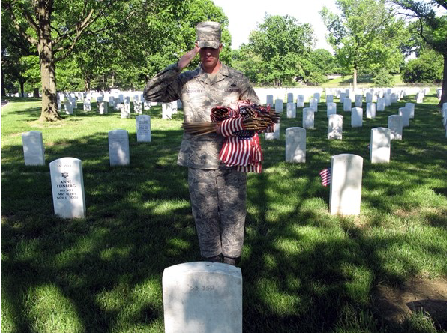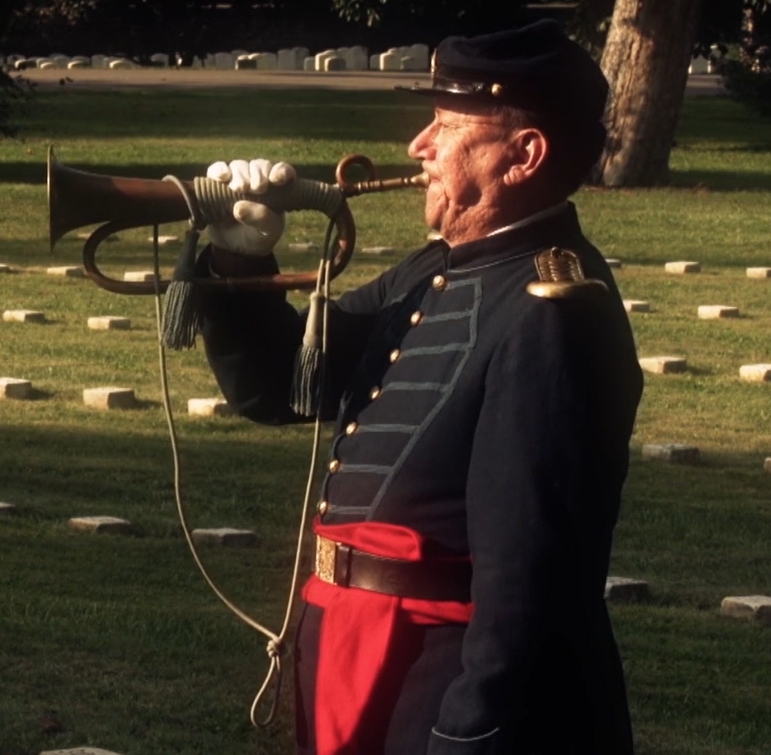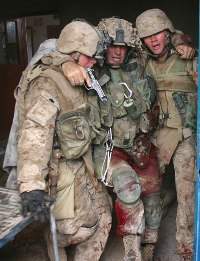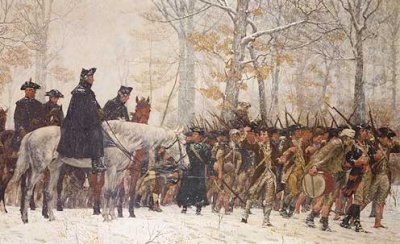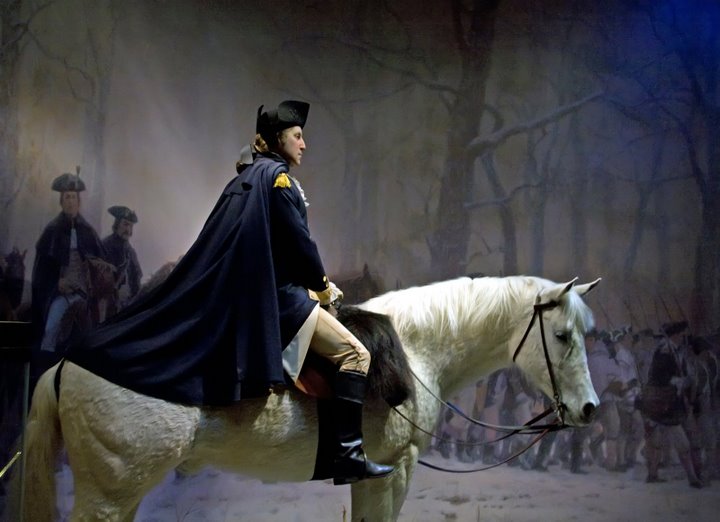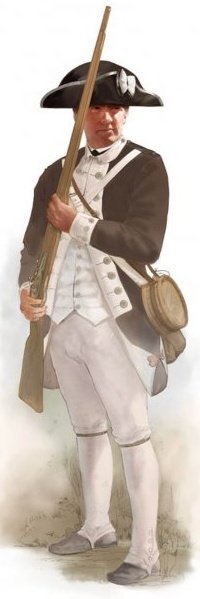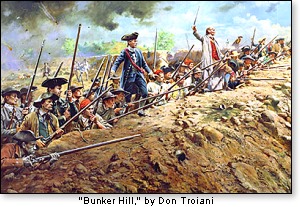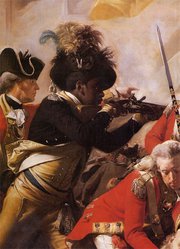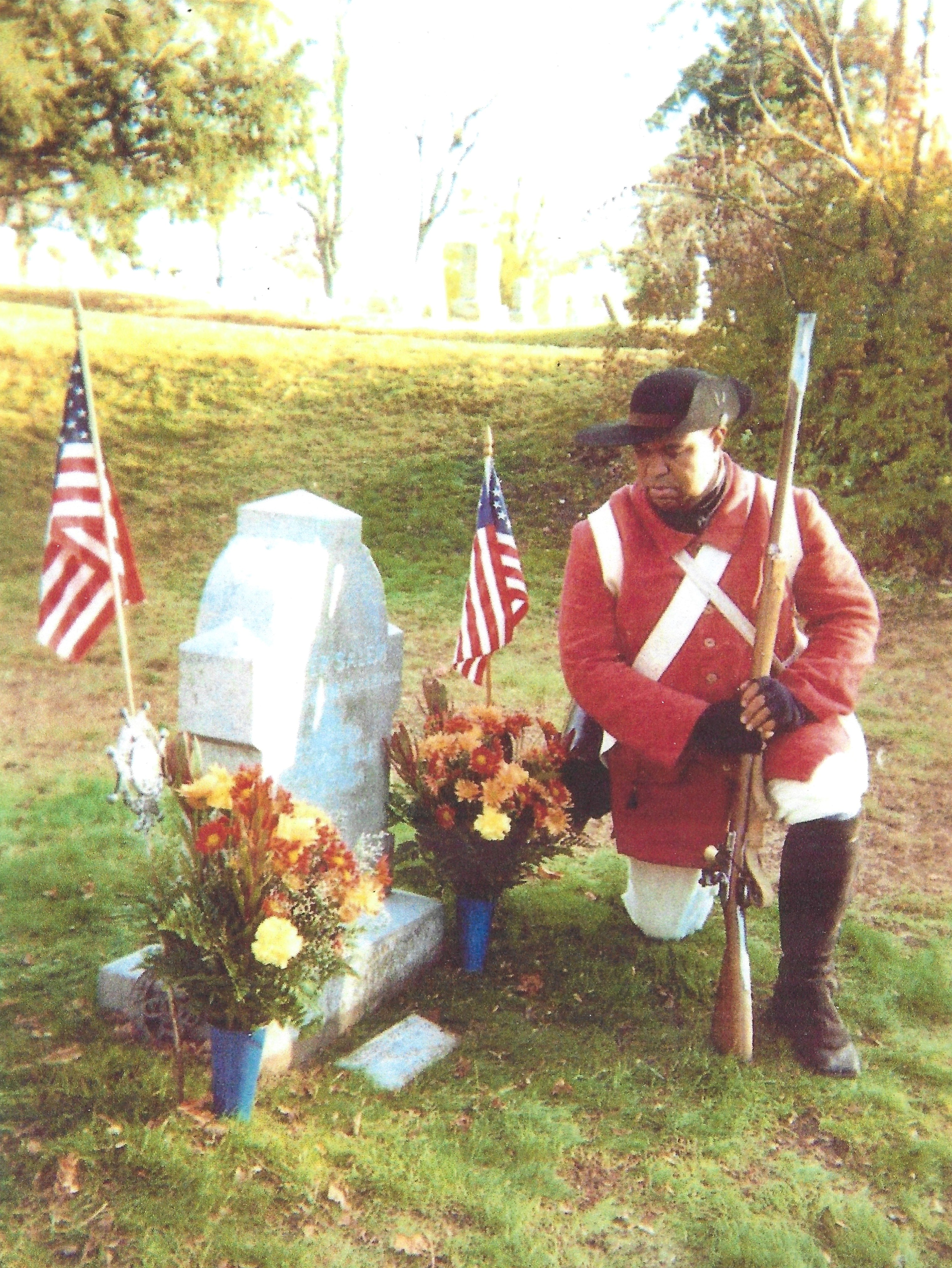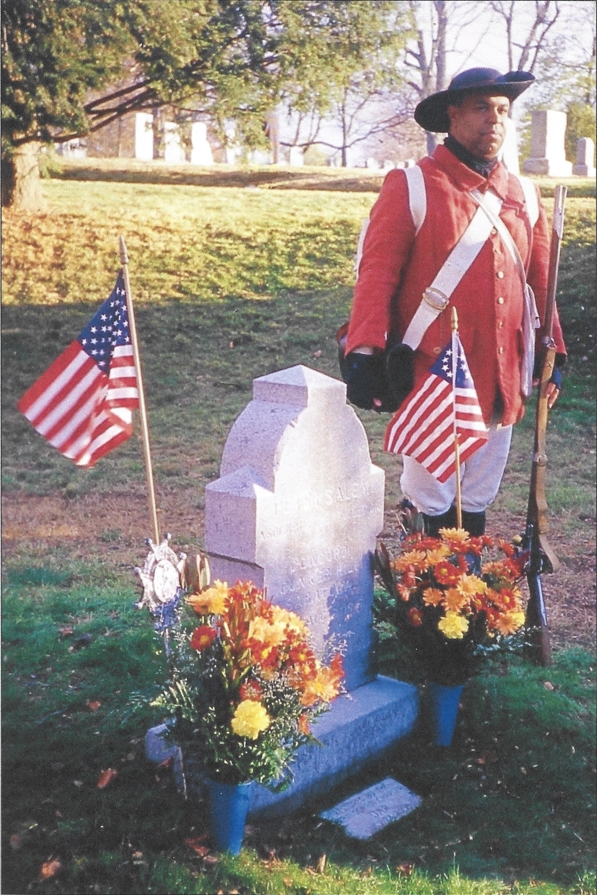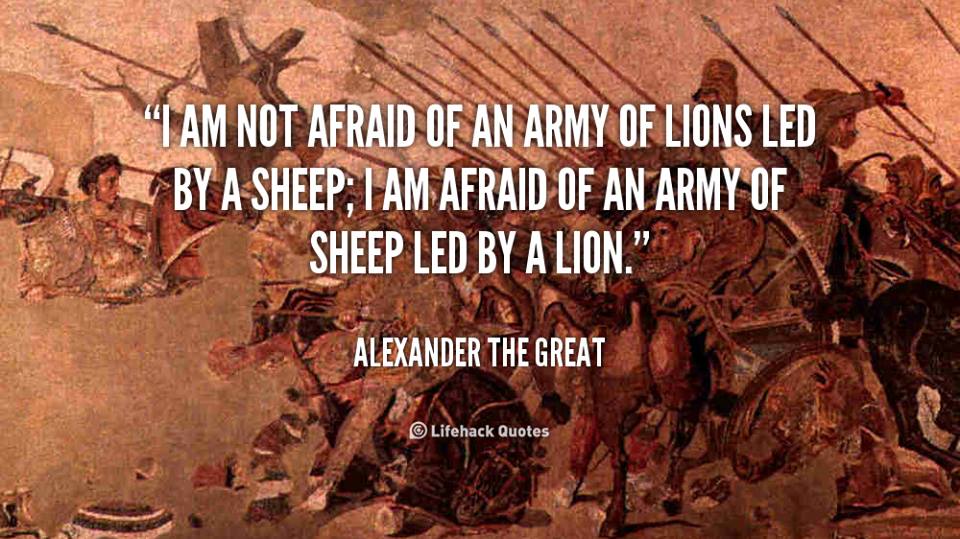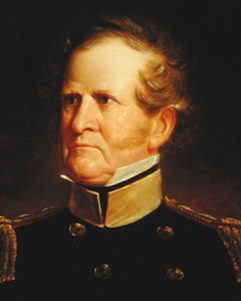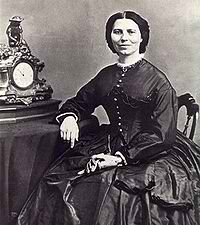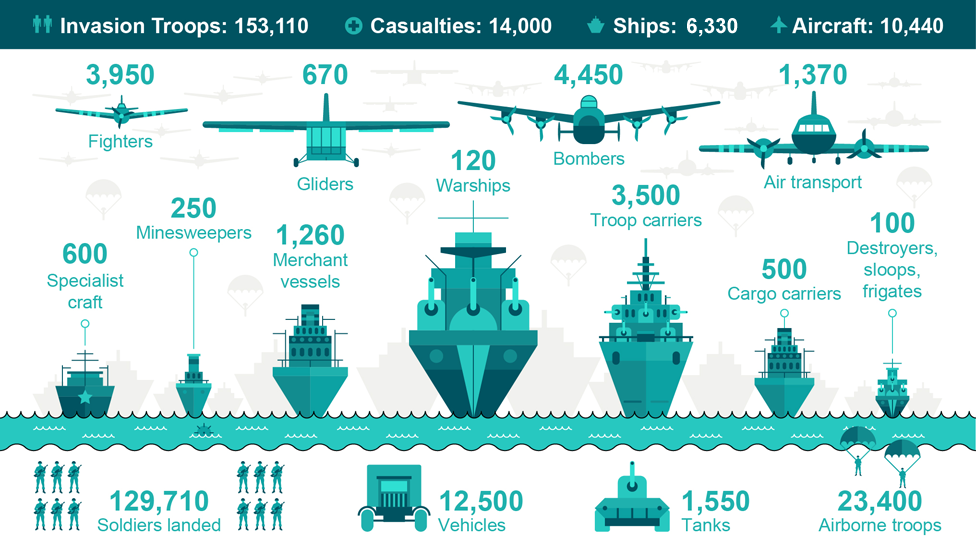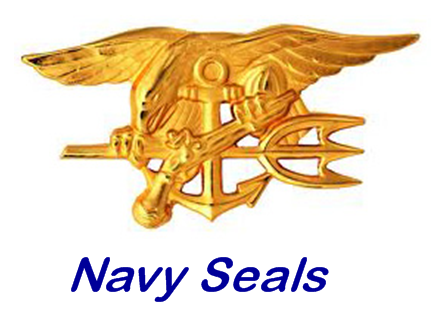EarsToHear.net
Honors
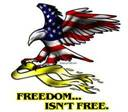
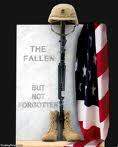 America's Armed Forces
America's Armed Forces
History of America's Military Campaigns
"The patriot's blood is the seed of Freedom's tree." --Thomas Campbell
"We sleep peaceably in our beds at night only because rough men stand ready to do violence on our behalf." -- George Orwell
Related Resources
Military History at Military.com
A HistoryCentral.com resource: Americas Wars - A Complete History
MEMORIAL DAY | A Soldier's Pledge
HONOR THE FALLEN
Honoring those who fought and died in Operation Enduring
Freedom, Operation Iraqi Freedom, and Operation New Dawn
Note: See Also Military and Veteran Resources for Medical, Health, Financial, and Related Resources
![]()

![]() Home
Home
![]() About
About
![]() Contact
Contact
![]() Search
Search
![]() News,
Commentary, & Action
News,
Commentary, & Action ![]() Recommended Books
Recommended Books
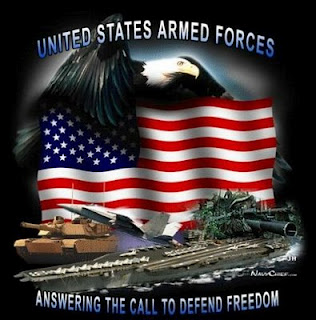
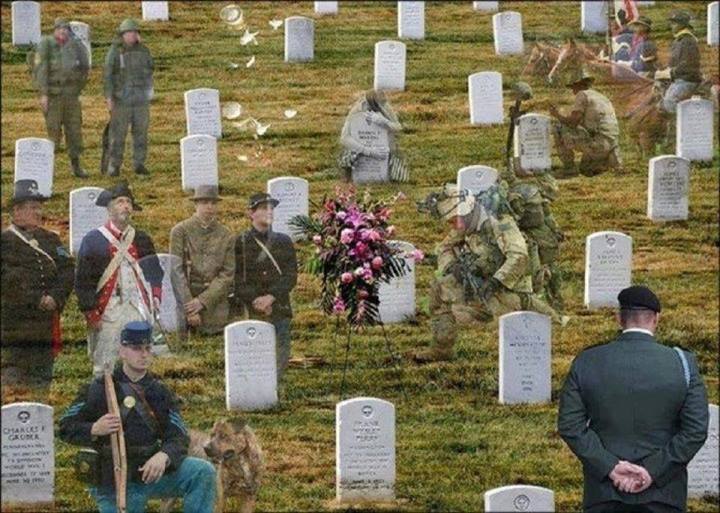
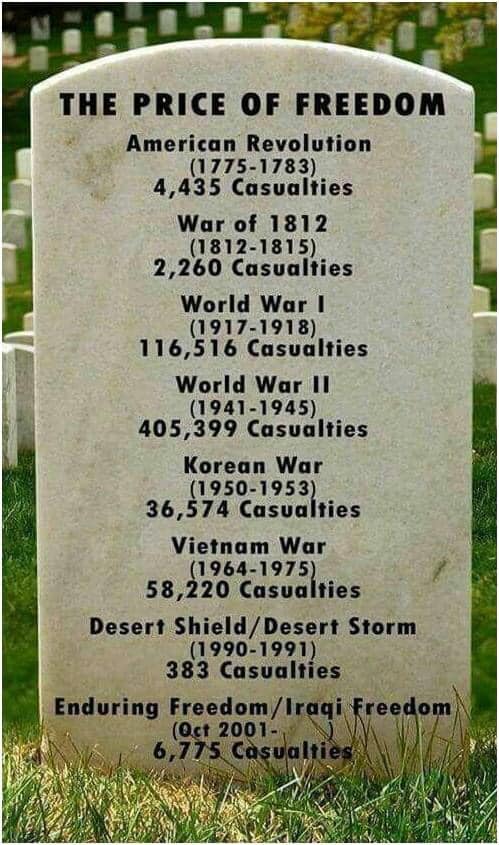
"Let the American youth never forget, that they possess a noble inheritance, bought by the toils, and sufferings, and blood of their ancestors; and capacity, if wisely improved, and faithfully guarded, of transmitting to their latest posterity all the substantial blessings of life, the peaceful enjoyment of liberty, property, religion, and independence." --Joseph Story, Commentaries on the Constitution, 1833
"This nation will remain the land of the free only so long as it is the home of the brave." -- American writer Elmer Davis (1880-1958)
"Contemplate the mangled bodies of your countrymen, and then say, 'What should be the reward of such sacrifices?' ... If ye love wealth better than liberty, the tranquility of servitude than the animating contest of freedom...crouch down and lick the hands, which feed you. May your chains sit lightly upon you, and may posterity forget that ye were our countrymen!" --Samuel Adams
![]()
From the Pulpit to the Battlefield
October 1, 1746 -- John Peter Muhlenberg was born on this day. (He would die on the same date in 1807). For a time, Muhlenberg pastored a church in Virginia. One Sunday in 1776, he ended his sermon with these words: "In the language of the Holy Writ, there is a time for all things. There is a time to preach and a time to fight." Then, he removed his clerical robes to reveal an army uniform. Three hundred men from the congregation rode off with him to join George Washington's 8th Virginia regiment.From the Pulpit to the Battlefield
- By Wendy Griffith CBN News July 4, 2007 (Only the video is at the CBN link. The full article and video is below.)
"There is a rank due to the United States, among nations, which will be withheld, if not absolutely lost, by the reputation of weakness. If we desire to avoid insult, we must be able to repel it; if we desire to secure peace, one of the most powerful instruments of our rising prosperity, it must be known that we are at all times ready for war." George Washington (Fifth Annual Message, 3 December 1793) Reference: George Washington: A Collection, W.B. Allen, ed. (488)
"History teaches that wars begin when governments believe the price of aggression is cheap." --President Ronald Reagan
A Constitutional Basis for Defense - By Jim Talent - Providing for the Common Defense: In brief, the Constitution says three things about the responsibility of the federal government for the national defense. National defense is the priority job of the national government.
Article One, Section Eight of
the Constitution lists 17 separate powers that are granted to
the Congress. Six of those powers deal exclusively with the national
defense, far more than any other specific area of governance, and grant
the full range of authorities necessary for establishing the defense of
the nation as it was then understood. Congress is given specific
authority to declare war, raise and support armies, provide for a navy,
establish the rules for the operation of American military forces,
organize and arm the militias of the states, and specify the conditions
for converting the militias into national service.
Article Two establishes the President as the
government's chief executive officer. Much of that Article relates to
the method for choosing the President and sets forth the general
executive powers of his office, such as the appointment and veto powers.
The only substantive function of government specifically assigned to the
President relates to national security and foreign policy, and the first
such responsibility granted him is authority to command the military; he
is the "Commander in Chief of the Army and Navy of the United
States, and of the Militia of the several States, when called into the
actual Service of the United States."
National defense is the only mandatory function of the national
government. Most of the powers granted to Congress are permissive in
nature. Congress is given certain authorities but not required by the
Constitution to exercise them. For example, Article One, Section Eight
gives Congress power to pass a bankruptcy code, but Congress actually
did not enact bankruptcy laws until well into the 19th century.
But the Constitution does require the federal government to protect
the nation. Article Four, Section Four states that the
"United States shall guarantee to every State a republican form of
government and shall protect each of them against invasion." In
other words, even if the federal government chose to exercise no other
power, it must, under the Constitution, provide for the common defense.
General Omar Bradley: "To ignore the danger of aggression is simply to invite it ... We shall doom our children to a struggle that may take their lives."
Douglas MacArthur: "The soldier, above all other people, prays for peace, for he must suffer and bear the deepest wounds and scars of war."
George Washington: "The willingness with which our young people are likely to serve in any war, no matter how justified, shall be directly proportional as to how they perceive the veterans of earlier wars were treated and appreciated by their Nation."
Ronald Reagan: "[T]here is a profound moral difference between the use of force for liberation and the use of force for conquest."
President Coolidge, 1923 Memorial Address: "There can be no peace with the forces of evil. Peace comes only through the establishment of the supremacy of the forces of good. That way lies through sacrifice...'Greater love hath no man than this, that a man lay down his life for his friends.'"
Alexander Hamilton, Federalist No. 11: "The rights of neutrality will only be respected when they are defended by an adequate power. A nation, despicable by its weakness, forfeits even the privilege of being neutral."
Alexander Hamilton, Federalist No. 34, 1788: "Let us recollect that peace or war will not always be left to our option; that however moderate or unambitious we may be, we cannot count upon the moderation, or hope to extinguish the ambition of others."
James Madison, letter to the Dey of Algiers, 1816: "It is a principle incorporated into the settled policy of America, that as peace is better than war, war is better than tribute."
: "I must study politics and war that my sons may have liberty to study mathematics and philosophy...."John Dickinson and Thomas Jefferson, Declaration of the Cause and Necessity of Taking up Arms, 1775: "With hearts fortified with these animating reflections, we most solemnly, before God and the world, declare, that, exerting the utmost energy of those powers, which our beneficent Creator hath graciously bestowed upon us, the arms we have compelled by our enemies to assume, we will, in defiance of every hazard, with unabating firmness and perseverance employ for the preservation of our liberties; being with one mind resolved to die freemen rather than to live as slaves."
General Douglas MacArthur: "We must unite in the high purpose that the liberties etched upon the design of our life by our forefathers be unimpaired and that we maintain the moral courage and spiritual leadership to preserve inviolate that mighty bulwark of all freedom, our Christian faith."
![]()
Wreaths Across America: WAA's mission - Remember, Honor, and Teach, is accomplished by various means throughout the year. WAA offers a selection of educational resources to assist in ensuring that current and future generations are aware of the price paid for their freedoms. Resources are available for grades K-12, and all are completely free to download.

Uncle Sam's Misguided Children Memorial Day is not celebrated, it is
observed. Memorial Day is also not a day for troops actively serving or who have
served. It is for those who have given their lives so you can live yours.
Veteran's Day is a celebration day where our country honors and thanks those who
are serving or who have. ...Whether you work at McDonald's, at a church, or at
a hospital. Whether you are a doctor, a student, a musician, an illustrator, an
IT tech or a stay at home mom. Whether everything you have was inherited or you
are a self made person. It took that to get you where you are today, PLUS the
payments of countless men and women who lie under simple white crosses around
the globe.
So [on Memorial Day] while you grill, drink beer, hang out with family, mow
your lawn, catch up on Game of Thrones, enjoy a day off or if you are still
working; take a moment to remember. Say a prayer for those left behind. Imagine
a soldier's last moments in contrast to whatever you are doing at this moment.
And then live that moment to the fullest. Proudly, as an American. Maybe with a
little guilt. But accept that moment. It was a gift, free to you. Bought and
paid for by a young man or woman's short life. Now that it is yours, take it.
Make the most of it. It the closest you will ever get to repaying the debt.
Mark Twain: "It is a worthy thing to fight for one's freedom; it is another sight finer to fight for another man's."
On
Memorial Day we honor the soldiers who fought
and died that we may live free. From the
earliest beginnings of our nation to the present
time, they gave the last full measure of
devotion.
"It is the soldier, not the
reporter, |
![]()
--American writer Elmer Davis (1800-1858) Click the picture for VictoryOrDeath.mp3 by Newt Gringrich
Distinguishing between Patriots and cowards, our favorite Founder, Samuel Adams, said:
"Contemplate the mangled bodies of your countrymen, and then say, 'What should be the reward of such sacrifices?' ... If ye love wealth better than liberty, the tranquility of servitude than the animating contest of freedom...crouch down and lick the hands, which feed you. May your chains sit lightly upon you, and may posterity forget that ye were our countrymen!" PatriotPost.us"Congressmen who willfully take action during wartime that damages morale and undermine the military are saboteurs and should be arrested, exiled, or hung." ~ Abraham Lincoln
"The true soldier fights not because he hates what is in front of him, but because he loves what is behind him." --English writer G. K. Chesterton (1874-1936)
: August 7, 1782: At his headquarters in Newburgh, New York, General George Washington, the commander in chief of the Continental Army, creates the "Badge for Military Merit," a decoration consisting of a purple, heart-shaped piece of silk, edged with a narrow binding of silver, with the word Merit stitched across the face in silver. The badge was to be presented to soldiers for "any singularly meritorious action" and permitted its wearer to pass guards and sentinels without challenge. The honoree's name and regiment were also to be inscribed in a "Book of Merit." Washington's "Purple Heart" was awarded to only three known soldiers during the Revolutionary War: Elijah Churchill, William Brown, and Daniel Bissell, Jr.The "Book of Merit" was lost, and the decoration was largely forgotten until 1927, when General Charles P. Summerall, the U.S. Army chief of staff, sent an unsuccessful draft bill to Congress to "revive the Badge of Military Merit." In 1931, Summerall's successor, General Douglas MacArthur, took up the cause, hoping to reinstate the medal in time for the bicentennial of George Washington's birth.
On February 22, 1932, Washington's 200th birthday, the U.S. War Department announced the creation of the "Order of the Purple Heart." In addition to aspects of Washington's original design, the new Purple Heart also displays a bust of Washington and his coat of arms. The Order of the Purple Heart, the oldest American military decoration for military merit, is awarded to members of the U.S. armed forces who have been killed or wounded in action against an enemy. It is also awarded to soldiers who have suffered maltreatment as prisoners of war.
These Are The Most Decorated Service Members In U.S. History By Jacob H. - Throughout U.S. history, brave men and women have fought, bled and died for our country and freedom. All those who have ever served honorably deserve the highest respect. Yet there are times when some rise above the call of duty and perform their service in a way that makes them legends among heroes. Medals and decorations differ between time periods, as well as between branches of the military, so it is impossible to say exactly who the most decorated or most highly decorated service members are with absolute clarity. In fact, the only thing tougher than these brave men is trying to compare them. However, here is a list, not in any particular order, highlighting 10 of the most decorated service members in U.S. history.
American Minute On OCTOBER 26, 1774, the Provincial Congress of Massachusetts reorganized their defenses with (one-third) "quarter" of their regiments being "Minutemen," ready to fight at a minute's notice. These citizen soldiers drilled on the parade ground, many times led by a deacon or pastor, then went to church for exhortation and prayer. The Provincial Congress charged: "You...are placed by Providence in the post of honor, because it is the post of danger... The eyes not only of North America and the whole British Empire, but of all Europe, are upon you. Let us be, therefore, altogether solicitous that no disorderly behavior, nothing unbecoming our character as Americans, as citizens and Christians, be justly chargeable to us." The Provincial Congress issued a Resolution to Massachusetts Bay, 1774: "Resistance to tyranny becomes the Christian and social duty of each individual... Continue steadfast, and with a proper sense of your dependence on God, nobly defend those rights which heaven gave, and no man ought to take from us." Boston patriot Josiah Quincy stated: "Under God, we are determined that wheresoever, whensoever, or howsoever we shall be called to make our exit, we will die free men." (More at From the Pulpit to the battlefield.)
American Minute - August 27, 1776
- With Boston freed from British occupation, New York was the next target. General Washington moved his troops to New York and began to build defense works, fortifying Brooklyn Heights. Enthusiasm was high and Washington's ranks swelled to nearly 20,000. Before long, hundreds of British ships filled New York's harbor, carrying 32,000 troops. It was the largest invasion force assembled in world history up to that date. The thousands of wooden masts of the British ships were described as looking like a forest.As apprehension spread, General George Washington ordered, May 15, 1776: "The Continental Congress having ordered Friday the 17th instant to be observed as a Day of Fasting, Humiliation and Prayer, humbly to supplicate the mercy of Almighty God, that it would please Him to pardon all our manifold sins and transgressions, and to prosper the arms of the United Colonies, and finally establish the peace and freedom of America upon a solid and lasting foundation; The General commands all officers and soldiers to pay strict obedience to the orders of the Continental Congress; that, by their unfeigned and pious observance of their religious duties, they may incline the Lord and Giver of victory to prosper our arms."
Washington's men were encouraged by messengers from Philadelphia, July 9, 1776, who delivered a copy of the recently passed Declaration of Independence. Washington had it read out loud to his troops. The Declaration mentioned God four times: "Laws of Nature and of Nature's God..." "All Men are created equal, that they are endowed by their Creator with certain unalienable Rights..." "Appealing to the Supreme Judge of the World for the Rectitude of our Intentions..." "With a firm Reliance on the Protection of divine Providence." On AUGUST 27, 1776, the Battle of Brooklyn Heights took place.
It was the first major battle after America had officially declared its independence, and it was the largest battle of the entire war. Washington expected an attack from the sea, similar to what the British did at the Battle of Bunker Hill. Instead, 10,000 British troops landed a distance from New York and a British loyalist led them through Jamaica Pass, marching all night long to make a surprise attack on the Continental Army from behind. An estimated 3,000 Americans were killed or wounded compared to only 392 British casualties. Washington exclaimed: "Good God, what brave fellows I have lost this day," as he watched 400 soldiers of the First Maryland Regiment charge six times into the British lines, allowing the rest of the Continental Army find cover.
British General Howe trapped the 8,000 American troops on Brooklyn Heights with their backs against the sea. That night, Washington made the desperate decision to evacuate his entire army by ferrying it across the East River to Manhattan Island. The sea was boisterous where the British ships were, but providentially calm in the East River allowing Washington's boats to transport troops, horses and cannons. The next morning, as the sun began to rise, half of the America troops were still in danger, but a "miraculously" thick fog lingered blocking the evacuation from being seen by the British.
Major Ben Tallmadge, Washington's Chief of Intelligence, wrote: "As the dawn of the next day approached, those of us who remained in the trenches became very anxious for our own safety, and when the dawn appeared there were several regiments still on duty. At this time a very dense fog began to rise off the river, and it seemed to settle in a peculiar manner over both encampments. I recollect this peculiar providential occurrence perfectly well, and so very dense was the atmosphere that I could scarcely discern a man at six yards distance... We tarried until the sun had risen, but the fog remained as dense as ever." General Washington was on the last boat that left Brooklyn Heights. Had the Americans not been able to evacuate, the war would have ended there. As it happened, the British never again had such an opportunity to capture the entire American army at one time. Connecticut Governor Jonathan Trumbull had written earlier to General George Washington, July 13, 1775: "May the God of the armies of Israel shower down the blessings of his Divine Providence...in the day of battle and danger."
Endnotes Washington, George. August 27, 1776. John Fiske, The American Revolution, 2 vols. (Boston & New York: Houghton, Mifflin & Co., 1898), Vol. I, p. 212. Marshall Foster & Mary-Elaine Swanson, The American Covenant - The Untold Story (Roseburg, OR: Foundation for Christian Self-Government, 1981; Thousand Oaks, CA: The Mayflower Institute, 1983, 1992), p. 41. George F. Scheer & Hugh F. Rankin, Rebels & Redcoats (NY: The World Publishing Co., 1957), p. 171. Peter Marshall & David Manuel, The Light & the Glory (Old Tappan, NJ: Fleming H. Revell Co., 1977), p. 315.
American Minute with Bill Federer December 26 - The first six months of the Revolution saw the Continental Army chased out of New York, across New Jersey, and into Pennsylvania. Ranks dwindled from 20,000 to 2,000 exhausted soldiers- most leaving at year's end when their six-month enlistment was up. Expecting a British invasion, the Continental Congress fled Philadelphia and sent the word: "Until Congress shall otherwise order, General Washington shall be possessed of full power to order and direct all things." In a military operation, with the password "Victory or Death," Washington's troops crossed the ice-filled Delaware River at midnight Christmas Day. Trudging in a blinding blizzard, with one soldier freezing to death, they attacked the feared Hessian troops at Trenton, New Jersey, on daybreak DECEMBER 26, 1776, capturing nearly a thousand in just over an hour. A few Americans were shot and wounded, including James Monroe, the future 5th President. Washington wrote August 20, 1778: "The Hand of Providence has been so conspicuous in all this-the course of the war-that he must be worse than an infidel that lacks faith, and more wicked that has not gratitude to acknowledge his obligations; but it will be time enough for me to turn Preacher when my present appointment ceases."
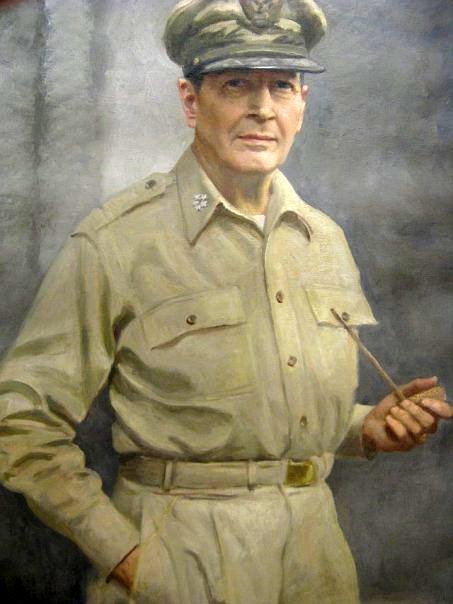 American
Minute with Bill Federer "No nation may survive in freedom once its
people become servants of the State" -General Douglas MacArthur
"Our threat is from the insidious forces working from within
which have already so drastically altered the character of our free
institutions" -General Douglas MacArthur, Lansing, Michigan, May 15,
1952. ...MacArthur stated: "It is fatal to enter a war without the will
to win it," and "In war there is no substitute for victory."
American
Minute with Bill Federer "No nation may survive in freedom once its
people become servants of the State" -General Douglas MacArthur
"Our threat is from the insidious forces working from within
which have already so drastically altered the character of our free
institutions" -General Douglas MacArthur, Lansing, Michigan, May 15,
1952. ...MacArthur stated: "It is fatal to enter a war without the will
to win it," and "In war there is no substitute for victory."
...General Douglas MacArthur warned in a speech to the Salvation Army, December 12, 1951, stating: "History fails to record a single precedent in which nations subject to moral decay have not passed into political and economic decline. There has been either a spiritual awakening to overcome the moral lapse, or a progressive deterioration leading to ultimate national disaster."
...General Douglas MacArthur addressed Massachusetts State Legislature in Boston, July 25, 1951: No plan is advanced for easing the crushing burdens already resting upon the people. To the contrary, all that we hear are the plans by which such costs progressively may be increased. New means are constantly being devised for greater call upon the taxable potential as though the resources available were inexhaustible. We compound irresponsibility by seeking to share what liquid wealth we have with others..."
...It seeks through covert manipulation of the civil power and the media of public information and education to pervert the truth, impair respect for moral values, suppress human freedom and representative government, and in the end destroy our faith in our religious teachings. This evil force, with neither spiritual base nor moral standard, rallies the abnormal and subnormal elements among our citizenry and applies internal pressure against all things we hold descent and all things that we hold right - the type of pressure which has caused many Christian nations abroad to fall and and their own cherished freedoms to languish in the shackles of complete suppression. As it has happened there it can happen here. Our need for patriotic fervor and religious devotion was never more impelling. There can be no compromise with atheistic Communism, no half way in the preservation of freedom and religion. It must be all or nothing. We must unite in the high purpose that the liberties etched upon the design of our life by our forefathers be unimpaired and that we maintain the moral courage and spiritual leadership to preserve inviolate that mighty bulwark of all freedom, our Christian faith."
![]()
![]()
The
Founders on Homosexuality by
Dave Miller,
Ph.D. - Of those living today in America who were alive 50 years ago,
few could have imagined, let alone predicted, that homosexuality would
encroach on our culture as it has. In fact, it would have been
unthinkable. The rapidity with which homosexual activists continue
successfully to bully the nation to normalize what once was universally
considered abnormal is astonishing. And toleration has not satisfied
them. Allowing their views to be taught in public schools has not
appeased them. No, they insist that societal endorsement extend to
redefining marriage to include same-sex couples.
...The Founding Fathers of these United States would be incredulous,
incensed, and outraged. They understood that acceptance of homosexuality
would undermine and erode the moral foundations of civilization. Sodomy,
the longtime historical term for same-sex relations, was a capital crime
under British common law. Sir William Blackstone, British attorney,
jurist, law professor, and political philosopher, authored his
monumental
Commentaries on the Laws of England from 1765-1769. These
commentaries became the premiere legal source admired and used by
America's Founding Fathers.
...How many Americans realize that while serving as the
Commander-in-Chief of the Continental Army during the Revolutionary War,
the Father of our country was apprised of a homosexual in the army. The
response of General Washington was immediate and decisive. He issued
"General Orders" from Army Headquarters at Valley Forge on Saturday,
March 14, 1778 (Search with quotes "George Washington, March 14, 1778,
General Orders" at
https://memory.loc.gov/ammem/):
At a General Court Martial whereof Colo. Tupper was President (10th
March 1778) Lieutt. Enslin of Colo. Malcom's Regiment tried for
attempting to commit sodomy, with John Monhort a soldier; Secondly, For
Perjury in swearing to false Accounts, found guilty of the charges
exhibited against him, being breaches of 5th Article 18th Section of the
Articles of War and do sentence him to be dismiss'd the service with
Infamy. His Excellency the Commander in Chief approves the sentence and
with Abhorrence and Detestation of such Infamous Crimes orders Lieutt.
Enslin to be drummed out of Camp tomorrow morning by all the Drummers
and Fifers in the Army never to return; The Drummers and Fifers to
attend on the Grand Parade at Guard mounting for that Purpose
...Observe that the Father of our country viewed "sodomy" (the
18th-century word for homosexual relations) "with Abhorrence and
Detestation." Homosexuality was treated as a criminal offense in all of
the original thirteen colonies, and eventually every one of the fifty
states (see Robinson, 2003; "Sodomy Laws...," 2003). Severe penalties
were invoked for those who engaged in homosexuality. In fact, few
Americans know that the penalty for homosexuality in several states was
death, including New York, Vermont, Connecticut, and South Carolina
(Barton, 2000, pp. 306,482). Most people nowadays would be shocked to
learn that
Thomas Jefferson advocated "dismemberment" (castration) as the penalty
for homosexuality in his home state of Virginia, and even authored a
bill to that effect (1781, Query 14; cf. 1903, 1:226-227).
February 1, 2014 -
Military Chaplains Speak Up on Marriage and Homosexuality in the
Military -- /Christian
Newswire/ -- Before civilizations crumble, the last thing to hit the
fan is government-sponsored, government-forced, homosexuality, sodomy,
and pedophilia. Homosexuality is a psychiatric disorder and probably the
worst sin described in the Holy Bible due to the permanent damage caused
to what was or is or might have been a temple of the Spirit. The
consequences are said to be nothing short of eternal damnation, by
choice. It's a shame that the US military, historically known to be a
beacon of morality and religious tolerance and freedom, while the
civilian sector has engaged in immorality, is now having its nose shoved
in the dirt of filth to make the Sinners-in-Chief in the highest
echelons of politics--the perverts, the pedophiles, and the
psychiatrically ill--feel better about themselves.
Retired Military Chaplain Jim Linzey, a Baptist minister, states
that "the teachings of the Church are an elaboration of the laws that
Jesus gave when He said, 'But from the beginning of the creation, God
"made them male and female." "For this reason a man shall leave his
father and mother and be joined to his wife, and the two shall become
one flesh"; so then they are no longer two, but one flesh' (Mark
10:6-8). Jesus' teaching emphasizes the unity between a man and his
wife. Jesus also said, 'Therefore what God has joined together, let not
man separate' (Mark 10:9, NKJV). Based on Jesus' statement, it is a
moral obligation to remain married once the marriage is consummated."
There is a biblical basis for separation. "But the point is that
marriage between men and women are the foundation of society, including
military society," said Chaplain Valerie Potter, who is Methodist.
Military couples face many trials, including separations due to
deployments. Chaplains have a crucial role to counsel them, to help them
keep their marriages intact. As Chaplain Frank Johnson, a Baptist
minister, said, "Marriage is a combat multiplier in that it gives
married troops hope and a reason to fight well, defending ones country,
of which marriage and families are the foundation; it gives troops a
reason to live and come home." ..."But homosexuality is a combat divider,
dividing one's reason to live while taking breaks on the combat field to
change diapers all because their treacherous sin causes them to lose
control of their bowels," said Chaplain John R. Kauffman, a Pentecostal
minister. "How do you win a war like that? What a spectacle in the face
of moral Muslims who detest homosexuality," he continued. As
a military chaplain, Rev. Linzey has counseled Soldiers struggling with
homosexuality who left the military and some who had HIV. "Homosexuality
was not a pleasant sin for these Soldiers," Linzey said. "They were
laden with guilt and wished they could be freed from this most vile
bondage, destroying their mental, spiritual, emotional, and physical
well-being. But only a penitent heart in the soul of one who would
receive the atoning sacrifice of Jesus the Christ can be free." God have
mercy on the US military.
![]()
American Minute for December 19th: Driven into Pennsylvania by the British, the Continental Army set up camp at Valley Forge, DECEMBER 19, 1777, just 25 miles from British occupied Philadelphia. Lacking food and supplies, soldiers died at the rate of twelve per day. Of 11,000 soldiers, 2,500 died of cold, hunger and disease. A Committee from Congress reported "feet and legs froze till they became black, and it was often necessary to amputate them." Soldiers were there from every State in the new union, some as young as 12, others as old as 60, and though most were white, some were African American and American Indians. Quaker farmer Isaac Potts observed General Washington kneeling in prayer in the snow. Hessian Major Carl
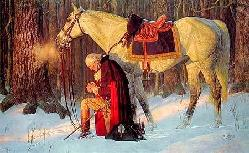
American Minute for January 3rd: Frederick the Great of Prussia called these ten days "the most brilliant in the world's history." After winning the Battle of Trenton, Christmas night, George Washington's small force met General Cornwallis' 8,000 man British army. The night before the battle, Washington left his campfires burning and silently marched his army around the back of the British camp at Princeton, New Jersey. At daybreak, JANUARY 3, 1777, Washington attacked, capturing three regiments of British troops. Enthusiasm swept America. Yale President Ezra Stiles stated in an Election Address before the Governor and General Assembly of Connecticut: "In our lowest and most dangerous state, in 1776 and 1777, we sustained ourselves against the British Army of 60.000 troops, commanded by...the ablest generals Britain could procure throughout Europe, with a naval force of 22,000 seamen in above 80 men-of-war. Who but a Washington, inspired by Heaven, could have conceived the surprise move upon the enemy at Princeton-or that Christmas eve when Washington and his army crossed the Delaware?" Ezra Stiles continued: "The United States are under peculiar obligations to become a holy people unto the Lord our God."
![]()
...An eyewitness, J. Thomas Scharf, in History of Western Maryland, described a demonstration by Captain Michael Cresap's rifle company of "upwards of 130 men": "(To] show the gentlemen of the town their dexterity at shooting. A clapboard, with a mark the size of a dollar, was put up; they began to fire off-hand, and the bystanders were surprised, so few shots being made that were not close to or in the paper. "When they had shot for a time in this way, some lay on their backs, some on their breast or side, others ran twenty or thirty steps, and, firing, appeared to be equally certain of the mark. With this performance the company was more than satisfied, when a young man took up the board in his hand, not by the end, but by the side, and holding it up, his brother walked to the distance, and very coolly shot into the white; laying down his rifle, he took up the board, and, . holding it as was held before, the second brother shot as the former had done. "By this exercise I was more astonished than pleased. But will you believe me, when I tell you, that one of the men took the board, and placing it between his legs, stood with his back to the tree, while another drove the center?"
 ...Other eyewitness accounts of
Cresap's company, published in The Virginia Gazette, also report on their
marksmanship, suggesting that they were capable of one to two minutes of
arc accuracy: "We mention a fact which can be fully attested by several
of the reputable persons who were eyewitnesses of it. Two brothers in the
company took a piece of board five inches broad and seven inches long,
with a bit of white paper, about the size of a dollar, nailed in the
centre; and while one of them supported this board perpendicularly between
his knees, the other, at the distance of upwards of sixty yards, and
without any kind of rest, shot eight bullets through it successively, and
spared a brother's thigh! "Another of the company held a barrel stave
perpendicularly in his hands with one edge close to his side, while one of
his comrades, at the same distance, and in the manner before mentioned,
shot several bullets through it, without any apprehension of danger on
either side. "The spectators appearing to be amazed at these feats, were
told that there were upwards of fifty persons in the same company who
could do the same thing; that there was not one who could not plug
nineteen bullets out of twenty, as they termed it, within an inch of the
head of a tenpenny nail.
...Other eyewitness accounts of
Cresap's company, published in The Virginia Gazette, also report on their
marksmanship, suggesting that they were capable of one to two minutes of
arc accuracy: "We mention a fact which can be fully attested by several
of the reputable persons who were eyewitnesses of it. Two brothers in the
company took a piece of board five inches broad and seven inches long,
with a bit of white paper, about the size of a dollar, nailed in the
centre; and while one of them supported this board perpendicularly between
his knees, the other, at the distance of upwards of sixty yards, and
without any kind of rest, shot eight bullets through it successively, and
spared a brother's thigh! "Another of the company held a barrel stave
perpendicularly in his hands with one edge close to his side, while one of
his comrades, at the same distance, and in the manner before mentioned,
shot several bullets through it, without any apprehension of danger on
either side. "The spectators appearing to be amazed at these feats, were
told that there were upwards of fifty persons in the same company who
could do the same thing; that there was not one who could not plug
nineteen bullets out of twenty, as they termed it, within an inch of the
head of a tenpenny nail....John Harrower recorded a similar account of how a rifle company commander in Virginia sought to identify the best marksmen out of an overflow crowd of volunteers. The colonel's solution was a shooting contest: "Col. Washington ... made a demand of 500 Riflemen from the frontiers. But those that insisted on going far exceeded the number wanted when in order to avoid giving offence, the commanding officer chose his company by the following method, viz. He took a board of a foot square and with chalk drew the shape of a moderate nose in the center and nailed it up to a tree at 150 yards distance and those who came nighest the mark with a single ball was to go. But by the first 40 or 50 that fired the nose was all blown out of the board, and by the time his company was [filled] up, the board shared the same fate."
![]()
![]()
American Minute for January 17th
: The Battle of Cowpens, JANUARY 17, 1781, depicted in Mel Gibson's movie "The Patriot," was where American General Daniel Morgan had a line of militia fire into British General Cornwallis' and Colonel Tarleton's dragoons, regulars, Highlanders and loyalists. When the Americans retreated, the British pursued, only to be surprised by American Continentals waiting over the hill. In the confusion, the Americans killed 110 British and captured 830. Cornwallis regrouped and chased the Americans, arriving at the Catawba River just two hours after the Americans had crossed, but a storm made the river impassable. He nearly overtook them as they were getting out of the Yadkin River, but rain flooded the river. This happened again at the Dan River. British Commander Henry Clinton wrote: "Here the royal army was again stopped by a sudden rise of the waters, which had only just fallen (almost miraculously) to let the enemy over." In March of 1781, General Washington wrote to William Gordon: "We have...abundant reasons to thank Providence for its many favorable interpositions in our behalf. It has at times been my only dependence, for all other resources seemed to have failed us."
![]()
See also "From the Pulpit to the Battlefield"
"There is a time for all things, a time to preach and a time to pray, but those times have passed away. There is a time to fight, and that time has now come." --Peter Muhlenberg, from a Lutheran sermon read at Woodstock, Virginia, 1776
"In the beginning of the Contest with G. Britain, when we were sensible of danger we had daily prayer in this room for the divine protection. - Our prayers, Sir, were heard, and they were graciously answered." --Benjamin Franklin
![]()
|
Volume 1 |
Copyright@ George Quintal
Jr.
Brief summaries
of the extensive "Patriot Chronicles" series
compiled and written by: George Quintal Jr.
All Rights Reserved
Only Version Authorized by the Author. Please do not purchase/access/cite outdated or pirated versions. |
Volume 2 And the Siege of Boston 17 June 1775 |
![]()
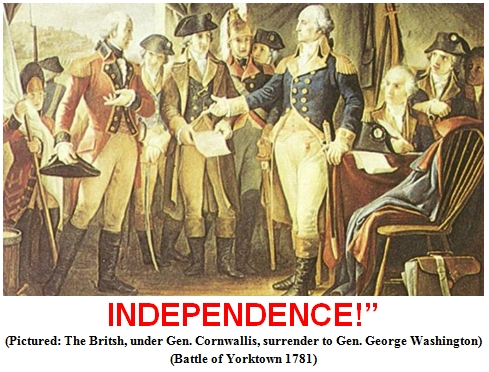
![]()
![]()
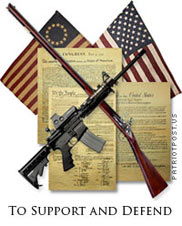 Home of the Free because of the Brave
Home of the Free because of the Brave
To those warriors who have passed on since, and to those who gave their youth, their health, and their peace of mind in the fight for freedom, particularly the freedom of speech, these Eternal writings are also for you.
"It is impossible for the man of pious reflection not to perceive in it [the Constitution] a finger of that Almighty hand which has been so frequently and signally extended to our relief in the critical stages of the revolution." --James Madison, Federalist No. 37
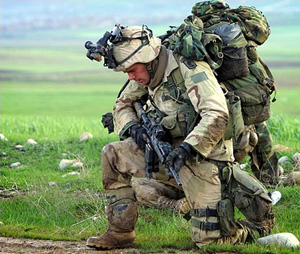
"The willingness of some to give their lives so that others might live never fails to evoke in us a sense of wonder and mystery." ..."Well, they didn't volunteer to die; they volunteered to defend values for which men have always been willing to die if need be, the values which make up what we call civilization." ...
"It is, in a way, an odd thing to honor those who died in defense of our country ... in wars far away. The imagination plays a trick. We see these soldiers in our mind as old and wise. We see them as something like the Founding Fathers, grave and gray-haired. But most of them were boys when they died, and they gave up two lives -- the one they were living and the one they would have lived. When they died, they gave up their chance to be husbands and fathers and grandfathers. They gave up their chance to be revered old men. They gave up everything for their country, for us. All we can do is remember." --Ronald Reagan General Winfield Scott - On October 31, 1861, during the Civil War, Union overall commander General Winfield Scott stepped down and retired from the Army. At over seventy years of age, Scott cited his ailing health. It was a liability to the Union war effort. General Scott had been serving in the Army since 1808, when Thomas Jefferson was President, and he retired during Abraham Lincoln's Presidency, meaning that he had served under fourteen different Presidents.Scott took part in the War of 1812, where he fought many key battles along the Niagara River, and he also battled the Seminoles in Florida in 1836. However, his biggest claim to fame was his service in the Mexican American War. During the war, Scott led a spectacular campaign through central Mexico and eventually took Mexico City itself. To do this, Scott took a major risk in cutting himself off from the sea and his supply lines. In the end, the risk paid off and the taking of Mexico City forced Mexico to come to the peace table.
When the Civil War began in 1861, General Scott was the highest-ranking officer in the Army and he was consulted by President Lincoln, who asked him to come up with a plan to beat the Confederacy. His plan was known as the "Anaconda Plan." It called for the blockading of Southern ports to cut off supplies to Confederate armies. The plan was highly criticized for being too "sluggish," but in the end it would be a play a crucial role in the Union's victory.
By October 1861, Scott's advanced age began to catch up to him. He suffered from gout and was barely able to mount a horse. On October 31, he retired, moving to West Point, New York where he commenced to writing his memoirs and lived out the rest of his days peacefully, dying in 1866.
![]()
President Andrew Jackson (1767-1845)
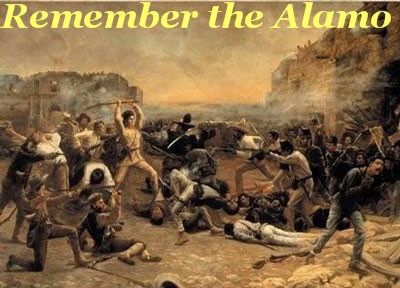
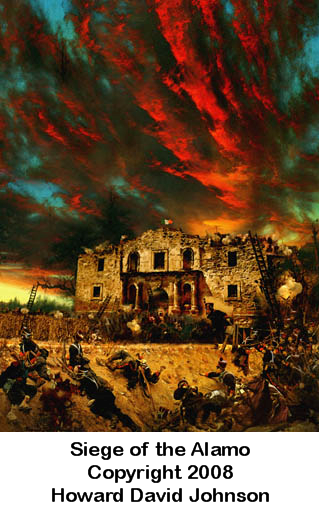
REMEMBERING THE ALAMO By Chuck Baldwin - March 6 marks the anniversary of the fall of the Alamo back in 1836. For more than 13 days, 186 brave and determined patriots withstood Santa Anna's seasoned army of over 4,000 troops. To a man, the defenders of that mission fort knew they would never leave those ramparts alive. They had several opportunities to leave and live. Yet, they chose to fight and die. How foolish they must look to this generation of spoiled Americans. It is difficult to recall that stouthearted men such as Davy Crockett (a nationally known frontiersman and former Congressman), Will Travis (only 23 years old with a little baby at home), and Jim Bowie (a wealthy landowner with properties on both sides of the Rio Grande) really existed.
These were real men with real dreams and real desires. Real blood flowed through their veins. They loved their families and enjoyed life as much as any of us. There was something different about them, however. They possessed a commitment to liberty that transcended personal safety and comfort. Early in the siege, Travis wrote these words to the people of Texas: "Fellow Citizens & Compatriots: I am besieged by a thousand or more of the Mexicans under Santa Anna.
. . . The enemy has demanded a surrender at discretion, otherwise the garrison are to be put to the sword . . . I have answered the demand with a cannon shot & our flag still waves proudly from the walls. I shall never surrender or retreat. . . . VICTORY OR DEATH! P.S. The Lord is on our side. . . ." ...Please try to remember the heroes of the Alamo as you watch our gutless political and religious leaders surrender to compromise and political correctness. Try to recall the time in this country when ordinary men and women had the courage of their convictions and were willing to sacrifice their lives for freedom and independence.
One thing is certain: those courageous champions at the Alamo did not die for a political party or for some "lesser of two evils" mantra. They fought and died for a principle, and that principle was liberty and independence. So did the men at Lexington and Concord. That is our heritage. ...Today, however, our national leaders are in the process of turning America over to the very forces that the Alamo defenders gave their lives resisting. On second thought, do they look foolish, or do we?
![]()
Clara Barton was present at some of the bloodiest battles of the Civil War: Cedar Mountain, Second Manassas, Antietam, and Fredericksburg. ...With doctors too busy to keep medical records, Clara wrote in her diary the names of the men who died and where they were buried. Her diary is at the Clara Barton National Historic Site in Maryland.
... at Chatham, Clara saw 'hundreds of the worst wounded men I have ever seen,' occupying every room of the house. They 'covered every foot of the floors and porticos' and stair landings. A man 'thought himself rich' if he laid under a table where he would not be stepped on. Clara saw five men stuffed onto four shelves of a cupboard. Others shivered in the cold muddy yard on blankets, waiting for someone inside to die so they could be brought in. Clara set up a soup kitchen in a tent in the yard to help them.
![]()
"It is important also to consider, that the surest means of avoiding war is to be prepared for it in peace." -- Joseph Story (Commentaries on the Constitution, 1833) Reference: Story, Commentaries on the Constitution, 415. The Patriot Post Founders' Quote Daily
![]()

Military Stories (Reader's Digest) Read true stories about America's military heroes at home and abroad.
WWII: A Look Back
Solving a Mystery at Sea
Slide Show: The Search for the Grunion
Two Pilots, Friends for Life
The Navajos' Unbreakable Code
Medal of Honor: Profiles in Valor
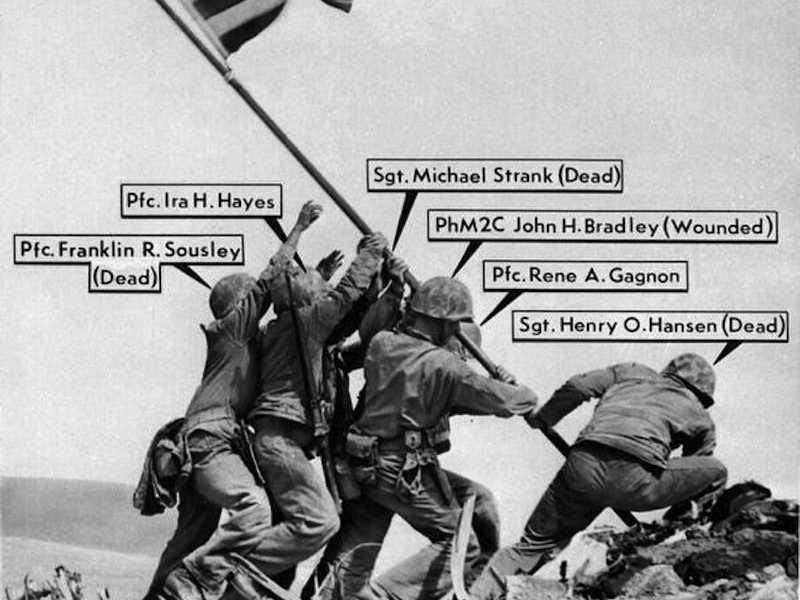
The Price of Victory Harris Sherline - The cost of war is a frequent topic these days in the media and politics, with numbers being cited about Iraq and Afghanistan, the defense budget and the U.S. military in general. But, the following commentary, which was sent to me by a friend whose career as an engineer at Lockheed spanned some 28 years working on top secret aircraft, is the first detailed analysis that I have seen. It's worth a look. Lots of specifics about the cost of things, but keep in mind that there has been 1,323% inflation since 1942. -- HRS
Most Americans who were not adults during WWII have no understanding of the magnitude of it. This listing of aircraft facts gives a bit of insight. *276,00 aircraft manufactured in the U.S. *43,000 planes lost overseas, including 23,000 in combat. *14,000 lost in the continental U.S. *The US civilian population maintained a dedicated effort for four years, many working long hours seven days per week and often also volunteering for other work. *WWII was the largest human effort in history.
American Minute with Bill Federer: Four Chaplains Day: Sinking of USAT
Dorchester & Courageous Self-Sacrifice
In the chaos of fire, smoke, oil and ammonia,
four chaplains calmed sailors and distributed life jackets: When there were no
more life jackets, the four chaplains ripped off their own and put them on four
young men. As the ship went down, survivors floating in rafts could see the four
chaplains linking arms and bracing themselves on the slanting deck. They bowed
their heads in prayer as they sank to their icy deaths.
Survivor Grady Clark wrote: "As I swam away
from the ship, I looked back. The flares had lighted everything. The bow came up
high and she slid under. The last thing I saw, the Four Chaplains were up there
praying for the safety of the men. They had done everything they could. I did
not see them again. They themselves did not have a chance without their life
jackets."
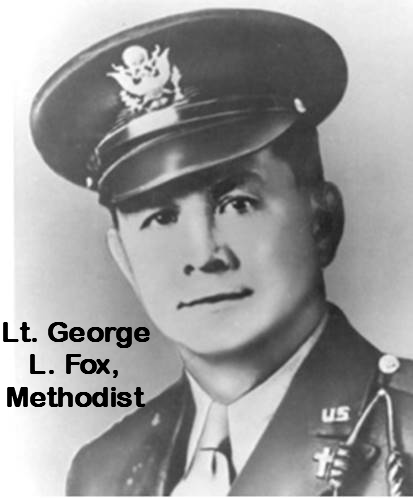
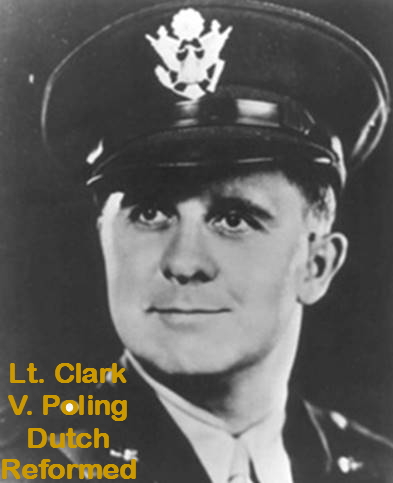
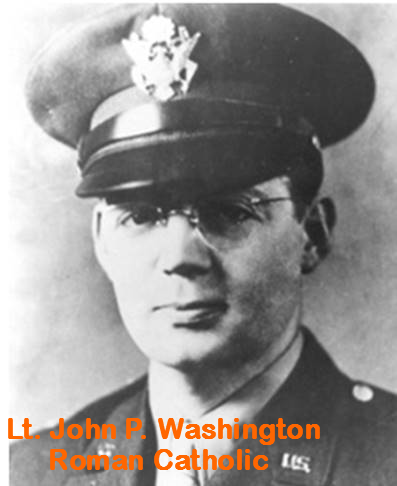
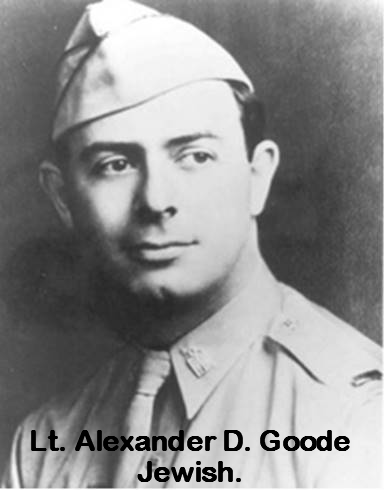
WW II : RARE COLOR FILM : AIRCRAFT CARRIER IN THEPACIFIC - There wasn't much color shot in the '40s - extremely expensive then, with a complicated and exacting processing process. Make sure your sound is on for the narration.
Japanese Surrender - Amazing Footage Sept 2, 1945... Actual film made of the surrender ceremony of the Japanese to McArthur in Tokyo Bay in September 1945. Actual voice of the General. Never been shown to the general public before. See the other signers to the document, from New Zealand/Australia to Europe/Russia.
VJ Day, Honolulu Hawaii, August 14, 1945 by Richard Sullivan - ...my Dad shot this film along Kalakaua Ave. in Waikiki capturing spontaneous celebrations that broke out upon first hearing news of the Japanese surrender. Kodachrome 16mm film: God Bless Kodachrome, right? I was able to find an outfit (mymovietransfer.com) to do a much superior scan of this footage to what I had previously posted, so I re-did this film and replaced the older version There are more still images from this amazing day, in color, at discoveringhawaii.com
Let's Never Forget Just How ENORMOUS D-Day Really Was
- By Kevin Hobster - D-Day: the massive military operation known at the time as Operation Neptune that saw the United States and the Allies invade Normandy, France, was the largest seaborne invasion in world history. It ignited the liberation of France from the Nazis as well as the Allies, victory in Europe in general. The amphibious landings are legendary, just like the incredibly brave men who manned the operation, but it was so much more than the famous landing crafts. This graphic (courtesy of the BBC [next item]) does a great job of helping us visualize the enormity of the invasion. There was really nothing else like it, ever. Or since. Let's never forget the more than 14,000 courageous military service members who gave their life on this day. They saved us from tyranny, they preserved our freedom and we should be forever grateful.D-Day: How was the biggest ever seaborne invasion launched?
(BBC) - 'D-Day Has Come' - A 20th Century Armada - Planning every last detail - Innovation to overcome the enemy - Building a DIY harbour - The art of deception - Were there alternatives to D-Day? - Where next?D-Day - PragerU Video By Peter Caddick-Adams May 27, 2019 - On June 6, 1944, Allied forces stormed the beaches of Normandy in northern France. Their goal: to liberate Western Europe from Nazi tyranny. From a distance, it might seem that victory was pre-ordained, but no one felt that way at the time. British military historian Peter Caddick-Adams tells the incredible story of what happened on that monumental day. ...Eisenhower gave the order: We go. Immediately, the greatest invasion fleet ever assembled set sail. On board were over 130,000 young soldiers. Consider for a moment who these soldiers were. The average age of the American GI was 21. Most had never seen combat or even been fifty miles from their hometown. As they sailed toward the French shoreline, Eisenhower wrote a press release in case of catastrophe. D-Day was an all-or-nothing affair. A new invasion strategy would take months, if not years, to devise. The initial battle reports were seriously troubling. At Omaha Beach, overlooked by cliffs honeycombed with trenches, cannon and machine-guns, the Americans took heavy losses. "I might have killed hundreds that morning," reflected German soldier Hein Severloh, manning one of the bunkers. The rough surf also took its toll. Dr. Harold Baumgarten, with the U.S Army's 116th Infantry, remembered, "Some of the fellows were pulled under by their wet combat jackets and heavy equipment. We couldn't help; they just drowned." Further along, Army Rangers also took heavy casualties as they scaled the cliffs under intense gunfire. However, by mid-day, with US naval support, the Germans, low on supplies and ammunition, began to fold. Nazi reinforcements, including hundreds of tanks, which might have made all the difference, were not ordered to Normandy until the afternoon. Before the Germans could mount an effective counter-attack, the Allies had secured all five landing beaches.
D-Day chaplain carried no weapons, led men off landing craft
By Mark Ellis - "I had the sword of the Spirit," said Lt. Col. George
Russell Barber, USAF (Ret.), who started his career with the horse
cavalry along the Mexican border before World War II. "We were all
afraid," said Col. Barber, as the men came ashore June 6, 1944, amidst a
hail of bullets and fiery explosions. "If a man says he's not
afraid, he's lying, but we had our faith."
My last visit with Colonel Barber was six months before his passing
on December 17, 2004 at age 90. He wanted to attend the dedication of
the World War II Memorial in Washington D.C. on May 29, 2004, but health
concerns kept him away. Although the strength in his legs was failing,
his mind was sharp and his grip still strong.
He served his country in four wars, and one of his most powerful
memories was the D-Day invasion on Omaha Beach. "On the Sunday before
D-Day I held services on 11 different ships in Weymouth Harbor for
thousands and thousands of soldiers," he said. "I gave away a lot of
pocket Gideon's Bibles, there are no atheists in foxholes."
On the fateful morning of the invasion, he went over the side of
his ship on a rope ladder into a flat-bottomed landing craft that held
30 soldiers. "When we hit the shore they let down the ramp I stood in
front and led my men off," Chaplain Barber recalled. "They were
shooting at us all around." To the right, Barber witnessed a horrible
sight. "Just before we landed I saw a landing ship hit a
Waiting to go ashore mine," he said. "It blew up and killed all 30
men. They were floating in the water and on the beach."
Without hesitation, Barber rushed to the sides of the wounded.
"I talked to as many as I could and prayed with them. I said, "Trust in
God.," As men died in his arms he recited John 14: "Do not let your
hearts be troubled. Trust in God; trust also in me. 'In my Father's
house are many mansions.' Men were being killed all around me," Barber
said. "We were all trying to dodge the bullets. Thank God I wasn't hit."
Miraculously, none of the four chaplains landing on the Normandy Beaches
that day were killed, according to Barber.
If they survived the barrage of hostile fire, the next challenge
for Barber and his men was to climb over steep cliffs just beyond the
shore. "I couldn't get over the 100 foot cliff so I had to dig my own
foxhole that night on the beach," he noted. "I prayed as if everything
depended on the Lord, and I dug as if everything depended on me. The
Lord and me got that foxhole pretty deep."
Unable to sleep, Barber crouched in his crude shelter amidst the
storm of battle. Through the night, he stared up at a frightening
display. "I watched the sky lit up by tracer bullets. Every fifth bullet
is a tracer bullet, so you can see it go up and come down. The next
morning I got over that cliff and I met Ernie Pyle, the famous war
correspondent for Stars and Stripes," Barber recalled. "We split a
can of Spam together. Later that day, the two men walked Omaha Beach
together, past the bodies of over 1500 who had fallen in battle. We saw
all the carnage and death and destruction."
Pyle wrote his own account of their walk together. "The
wreckage was vast and startling," he wrote. "In the water floated empty
life rafts and soldiers, packs and ration boxes. But there is another and
more human litter. It extends in a thin little line, just like a high
water mark, for miles along the beach. Here are socks and shoe polish,
sewing kits, diaries, Bibles and hand grenades. Here are toothbrushes
and razors, and snapshots of families back home staring up at you from
the sand."
World War II As You Have Never Seen It: Rare Color Footage Of The D-Day Landings (YouTube) - When the warship HMS Belfast fired the shot that launched the D-Day landings, it was carrying an unlikely passenger - Hollywood film director George Stevens. With Allied forces set to storm the Normandy beaches of Nazi-occupied France, Stevens was on-board making a unique 16 millimetre colour film journal. He had made his name in the 1930s, directing the likes of Fred Astaire and Ginger Rogers in 'Swing Time' (1936) and Cary Grant in 'Gunga Din' (1939). But in 1942, after seeing Leni Riefenstahl's Nazi propaganda movies, Stevens enlisted. General Dwight Eisenhower assigned him to head up the combat motion-picture coverage, a unit covering the war in black-and-white 35 millimetre film for newsreels and military archives. But while documenting the Allied forces' advance towards Berlin, he took with him a 16 millimetre camera and boxes of Kodachrome film on which he would shoot a personal visual diary of the war. The film canisters of the war were developed back in the US, but Stevens stored them and for decades they went untouched.
That changed when his son, George Stevens Jr, also a filmmaker, decided to make a documentary on his father's life and was amazed to discover what he found. An emotional Stevens remembers the first time he watched the films, astonished to see his young father heading to France on HMS Belfast. "This film came on and it was sort of grey-blue skies and barrage balloons, those big things that hung in the sky, and it was on a ship. It turned out (to be) the HMS Belfast, and it was suddenly I realised the morning of the 6th of June, the beginning of the greatest seaborne invasion in history," he said in a recent interview. "I had this feeling that my eyes were the first eyes that hadn't been there who were seeing this day in colour, and I watched this film unfold and on this ship - and all of these men with their flak jackets and anticipation of this day - and around a corner on the ship comes this man - helmet and jacket - and walks into a close-up, and it's my 37-year-old father. It was so moving."
George Stevens died in 1975. At some point after his death, his son took the best of his father's colour film and in 1994 produced a documentary entitled "George Stevens: D-Day to Berlin". The colour journal starts on D-Day - 6 June 1944 - and follows the filmmaker and his unit across Europe depicting in remarkable colour the devastation of French towns, the liberation of Paris, Generals De Gaulle, Patton and Montgomery in colour, German prisoners of war, and ghastly images from the Dachau concentration camp. The film is narrated by Stevens Jr and contains interviews with members of his father's team at the time, known as the "Stevens' Irregulars".
For Stevens, his father's collection remains the main historical record of the World War ll in colour film. "We thought at the time that this was the only colour film of the war in Europe. As it turned out, there was some German film that had not yet been discovered," he said. "But it is the greatest body of colour film, and World War II was a black-and-white war. That's how we see it. That's how we saw it. And suddenly to see it in colour, it just took on a whole other dimension."
- D-Day brings to mind unimaginable bravery and sacrifice, but the numbers involved are even harder to believe. By: Dave Patterson
American Minute for February 3rd: On the frigid night of FEBRUARY 3, 1943, the Allied ship Dorchester plowed through the waters near Greenland. At 1:00am, a Nazi submarine fired a torpedo into its flank, killing many in the explosion and trapping others below deck. It the ensuing chaos, four chaplains: a priest, a rabbi and two protestant ministers; distributed life jackets. When there were none left, the four chaplains ripped off their own jackets and put them on four young men. Standing embraced on the slanting deck, the chaplains bowed their heads in prayer as they sank to their icy deaths. Congress honored them by declaring this "Four Chaplains Day." On February 7, 1954, President Dwight Eisenhower remarked: "And we remember that, only a decade ago, aboard the transport Dorchester, four chaplains of four faiths together willingly sacrificed their lives so that four others might live. In the three centuries that separate the Pilgrims of the Mayflower from the chaplains of the Dorchester, America's freedom, her courage, her strength, and her progress have had their foundation in faith." Eisenhower concluded: "Today as then, there is need for positive acts of renewed recognition that faith is our surest strength, our greatest resource." American Minute with Bill Federer FEBRUARY - Four Chaplains Day. https://www.fourchaplains.org.
"While the San Diego-based U.S.S. Hoel was steaming toward Melbourne, Australia, on Ash Wednesday, its crew heard of terrible brush fires sweeping two Australian States. More than 70 people were killed and the destruction was great. Well, the crew of this American ship raised $4,000 from their pockets to help, but they felt that it wasn't enough. So, leaving only a skeleton crew aboard, the 100 American sailors gave up a day's shore leave, rolled up their sleeves, and set to work rebuilding a ruined community on the opposite end of the Earth. Just Americans being Americans, but something for all of us to be proud of. Stories like these -- of men and women around the world who love God and freedom -- bear a message of world hope and brotherhood like the rites of Passover and Easter that we celebrate." --Ronald Reagan
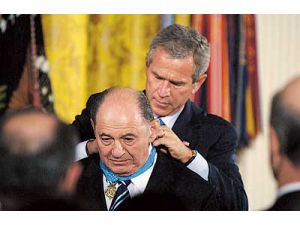 Portraits
of Valor: Tibor Rubin's story should be known by every American.
Born a Hungarian Jew, he was sent to die in a concentration camp as a
child. When freed by Americans, he vowed to God that he would become a
GI himself. He later saved his entire Army unit in Korea by defending a
mountaintop alone. When captured, he refused release so that he could
use lessons he learned in concentration camps to help other American
POWs survive. Few lives embody the love of God, and the greatness of
the human spirit, more than this child war refuge who received our
nation's highest honor.
Portraits
of Valor: Tibor Rubin's story should be known by every American.
Born a Hungarian Jew, he was sent to die in a concentration camp as a
child. When freed by Americans, he vowed to God that he would become a
GI himself. He later saved his entire Army unit in Korea by defending a
mountaintop alone. When captured, he refused release so that he could
use lessons he learned in concentration camps to help other American
POWs survive. Few lives embody the love of God, and the greatness of
the human spirit, more than this child war refuge who received our
nation's highest honor.
![]()
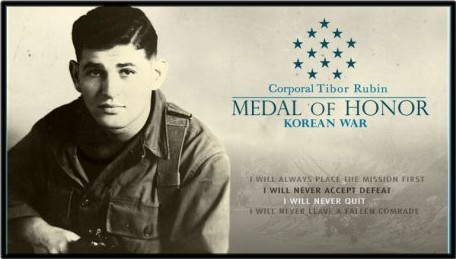
"Before You Go"
Why Did America Fight the Korean War? - (PragerU) - What do you know about the Korean War? If your answer is, "Not much," you're not alone. Often called "The Forgotten War," The Korean War pitted two world powers -- the Soviet Union and China -- against the United States in a defining conflict between communism and liberty. But Korea was a little country, far from the U.S., seemingly of little consequence to us. So why did we involve ourselves? Was it worth the cost of more than 35,000 American lives, over 100,000 American casualties, and billions of dollars? In this week's video, historian, author and Hoover Institution Senior Fellow Victor Davis Hanson explains why the Korean War happened, why America got involved, and why it transformed both Korea and the Cold War. Watch the video here and learn how the Korean War helped shape the world we live in today.
Why Did America Fight the Vietnam War? (PragerU) Most Americans are taught that the Vietnam War was a colossal failure. It lasted nearly two decades, cost over 58,000 American lives, and ended in America's humiliating withdrawal. But here's what most Americans aren't taught: We fought a very similar war in Korea, and won. We also won Vietnam...until Democrats in Congress snatched defeat from the jaws of victory. In this video, Victor Davis Hanson of Stanford University's Hoover Institution, shares the true history of the Vietnam War.
American Minute for November 13th: The Vietnam War Memorial was dedicated NOVEMBER 13, 1982, honoring 58,000 American troops who died. U.S. forces inflicted over a million enemy fatalities, yet politicians did not allow a victory. A former Communist North Vietnamese colonel, Bui Tin, called the American "peace movement" essential: "Every day our leadership would listen to the world news over the radio to follow the growth of the American anti-war movement. Visits to Hanoi by people like Jane Fonda and former Attorney General Ramsey Clark gave us confidence that we should hold on in the face of battlefield reverses." On October 12, 1967, during Operation Medina, Marine Sergeant George Hutchings of Charlie Company, 1st Battalion, 1st Marine Division, had a dozen men killed around him when ambushed by North Vietnamese in the Hai Lang jungle. Months later, after numerous battles, George was shot three times, bayoneted and left for dead. He survived and was later awarded the Purple Heart. Of the Vietnam Memorial, George Hutchings said: "On that wall is the name of Corporal Quinton Bice, who was hit in the chest with a rocket running a patrol in my place. A Christian, he had shared the Gospel with me, but I didn't understand it till he gave his life in my place."
![]()
By Harris Sherline
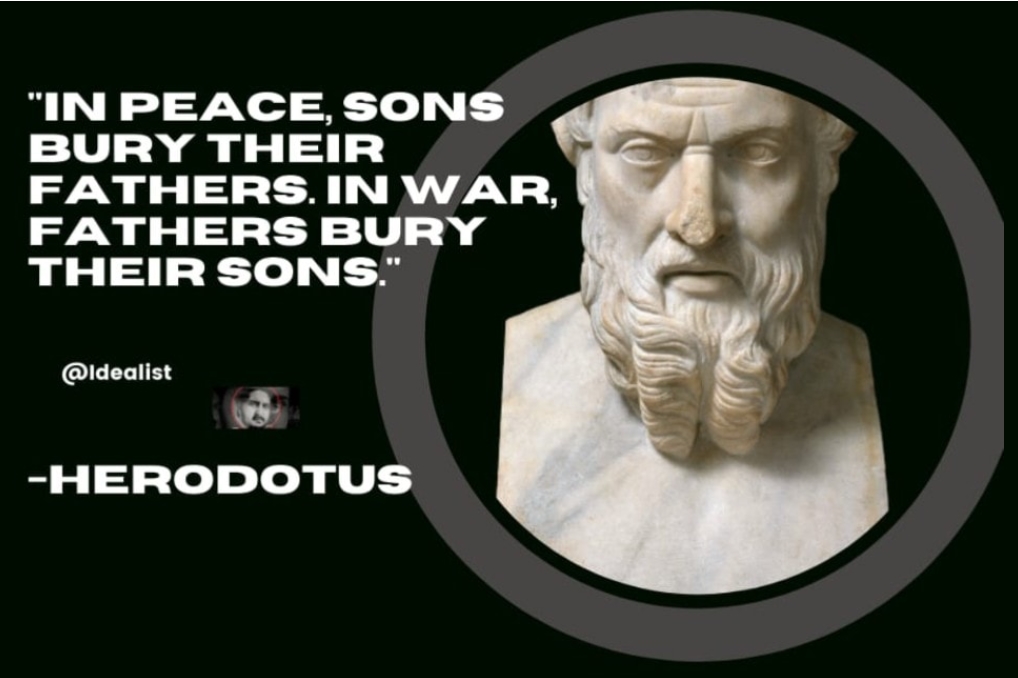
o There are 58,267 names now listed on the polished black
wall that commemorates the Vietnam War, including those added in
2010.
o The names are arranged in the order in which they were taken from us
by date, and within each date the names are alphabetized. It is hard to
believe it has been 37 years since the last casualties.
o Beginning at the apex on panel 1E and going out to the end of the east
wall, appearing to recede into the earth (numbered 70E, May 25, 1968),
then resuming at the end of the west wall, as the wall emerges from the
earth (numbered 70W, continuing May 25, 1968) and ending with a date in
1975. Thus the war's beginning and end meet. The war is complete, coming
full circle, yet broken by the earth that bounds the angle's open side
and contained within the earth itself.
o The first known casualty was Richard B. Fitzgibbon of North Weymouth,
Mass., listed by the Defense
Department as having been killed on June 8, 1956. His name is listed
on the Wall with that of his son, Marine Corps Lance Cpl. Richard B.
Fitzgibbon III, who was killed on Sept. 7, 1965.
o There are three sets of fathers and sons on the Wall.
o 39,996 on the Wall were just age 22 or younger.
o The largest age group, 8,283 were just 19 years old.
o 3,103 were 18 years old.
o 12 soldiers on the Wall were 17 years old.
o Five soldiers on the Wall were 16 years old.
o One soldier, Pfc. Dan Bullock, was 15 years old.
o 997 soldiers were killed on their first day in Vietnam.
o 1,448 soldiers were killed on their last day in Vietnam.
o 31 sets of brothers are on the Wall.
o 31 sets of parents lost two of their sons.
o 54 soldiers on the Wall attended Thomas
Edison High School in Philadelphia.
o Eight women are on the Wall, for nursing the wounded.
o 244 soldiers were awarded the Medal of Honor during the Vietnam War;
153 of them are on the Wall.
o Beallsville, Ohio, with a population of 475, lost six of her sons.
o West Virginia had the highest casualty rate per capita in the nation.
There are 711 West Virginians on the Wall.
o The Marines of Morenci: They led some of the scrappiest high school
football and basketball teams that the little Arizona copper town of
Morenci (population 5,058) had ever known and cheered.
o They enjoyed roaring beer busts. In quieter moments, they rode horses
along theCoronado Trail and
stalked deer in the Apache
National Forest. And in the patriotic camaraderie typical of
Morenci's mining families, the nine graduates of Morenci
High enlisted as a group in the Marine
Corps. Their service began on Independence Day 1966. Only three
returned home.
o The Buddies of Midvale, LeRoy Tafoya, Jimmy Martinez and Tom Gonzales, were all boyhood friends and lived on three consecutive streets in
Midvale, Utah, on Fifth, Sixth and Seventh avenues. They lived only a
few yards apart. They played ball at the adjacent sandlot ball field.
And they all went to Vietnam. In a span of 16 dark days in late 1967,
all three would be killed. LeRoy was killed on Nov. 22, the fourth
anniversary of President
John F. Kennedy's assassination. Jimmy died less than 24 hours later
on Thanksgiving Day. Tom was shot dead assaulting the enemy on Dec. 7,
Pearl Harbor Remembrance Day.
o The most casualty deaths for a single day was Jan. 31, 1968, 245
deaths.
o The most casualty deaths for a single month was May 1968, 2,415
casualties were incurred. That's 2,415 dead in a single month!
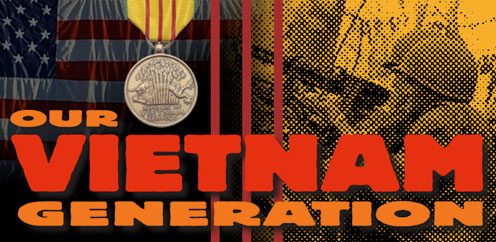
Video:
Our Vietnam
Generation: Michigan Vietnam Vets, but says it all for every Vietnam Vet.
The Vietnam Veterans Memorial Wall in Washington DC honors the fallen of the Vietnam War. Relatives and friends leave letters, poems, and photographs there and on this web site named The Virtual Wall. We bring the Vietnam Veterans Memorial to your home.
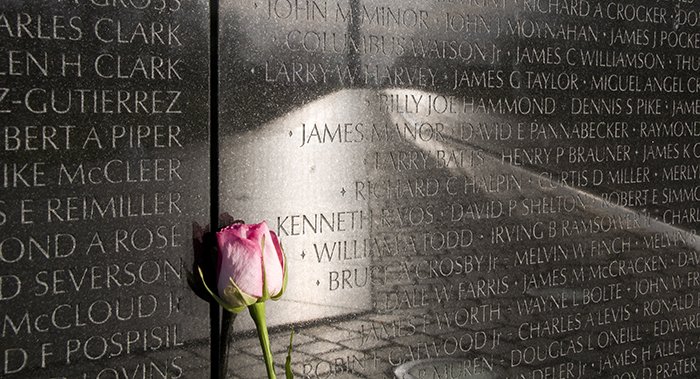
![]()
"It doesn't take a hero to
order men into battle.
It takes a hero to be one of those men who goes into battle."
General Norman Schwarzkopf
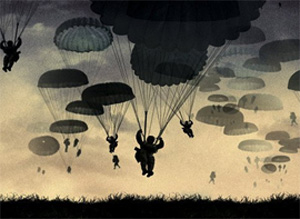
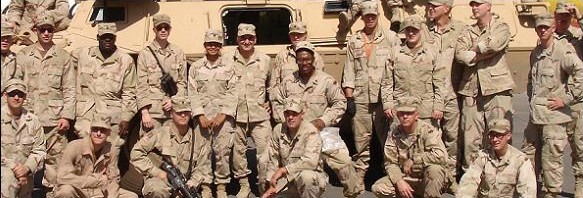
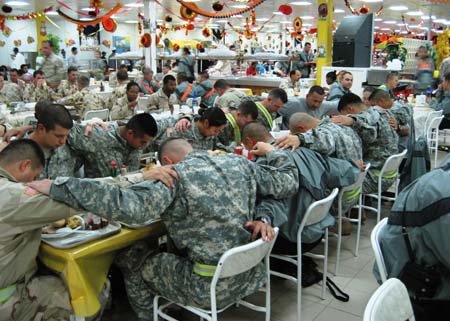
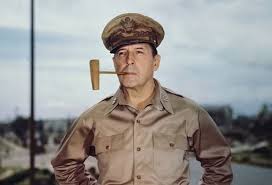
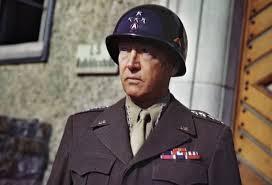
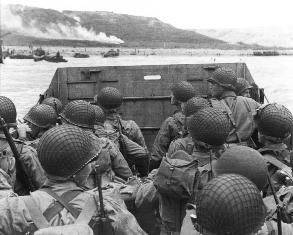
"It is foolish and wrong to mourn the men who died. Rather we should thank God that such men lived." General George S. Patton
Heroes aren't
athletes who set new sports records, or Hollywood actors who make daring films or politicians who make bold promises. Heroes are people who place themselves at risk for the benefit of others. --Oliver North"[L]et us solemnly remember the sacrifices of all those who fought so valiantly, on the seas, in the air, and on foreign shores, to preserve our heritage of freedom, and let us re-consecrate ourselves to the task of promoting an enduring peace so that their efforts shall not have been in vain." --Dwight Eisenhower
"The soldier, above all other people, prays for peace, for he must suffer and bear the deepest wounds and scars of war." --Douglas MacArthur
"I wish to have no connection with any ship that does not sail fast; for I intend to go in harm's way." --John Paul Jones
"
It is the madness of folly, to expect mercy from those who have refused to do justice; and even mercy, where conquest is the object, is only a trick of war; the cunning of the fox is as murderous as the violence of the wolf." --Thomas Paine
![]()
![]()
Veterans Day, we encourage teachers to visit the official Veterans Affairs website for instruction and learning aids on the history and significance of Veterans Day.
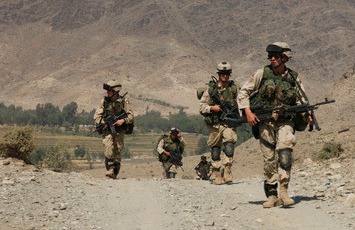
Distinguishing between Patriots and cowards, our favorite Founder, Samuel Adams, said: &"Contemplate the mangled bodies of your countrymen, and then say, 'What should be the reward of such sacrifices?' ... If ye love wealth better than liberty, the tranquility of servitude than the animating contest of freedom...crouch down and lick the hands, which feed you. May your chains sit lightly upon you, and may posterity forget that ye were our countrymen!" PatriotPost.us
Honoring those who risked, sacrificed, and paid the ultimate sacrifice, so that we may enjoy life, liberty, freedom, the pursuit of happiness and MTV. More than 41 million men and women have served in the Armed Forces of this country and over a million have died defending it. Learn the difference between cowards and patriots.
Medal of Honor Citations Since 1861 Hero is a word which gets applied to just about anyone in any kind of uniform these days. If you have a doubt as to what a hero really is, read a few of the 3,400 Medal of Honor recipient citations.
"
To be prepared for war is one of the most effectual means of preserving peace." --George Washington"Let every nation know, whether it wishes us well or ill, that we shall pay any price, bear any burden, meet any hardship, support any friend, oppose any foe to assure the survival and the success of liberty." --John F. Kennedy
![]()
World War II Cemeteries

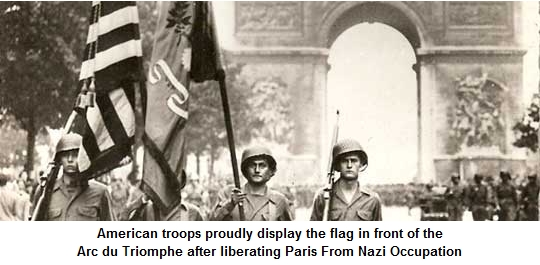
The American Cemetery at Aisne-Marne, France 2289 of our military dead.
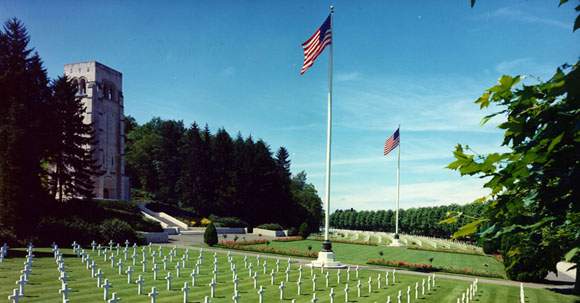
The American Cemetery at Ardennes, Belgium 5329 of our dead.
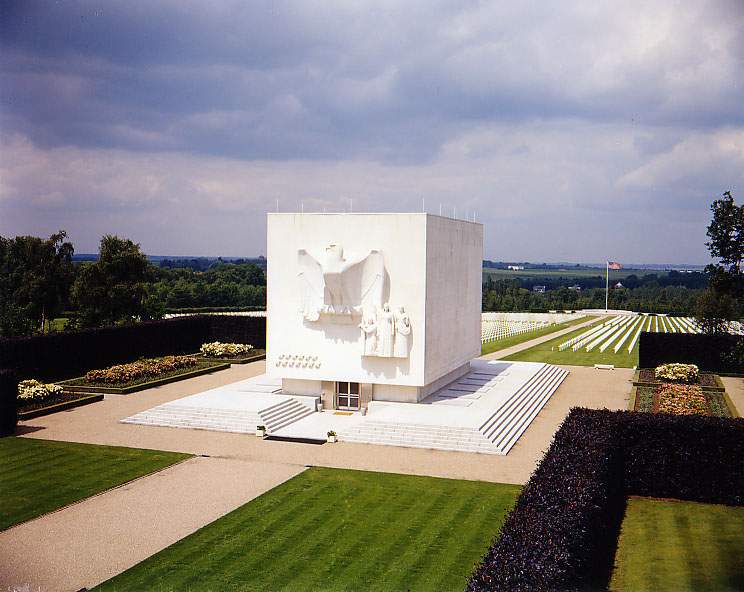
The American Cemetery at Brittany, France 4410 of our military dead.
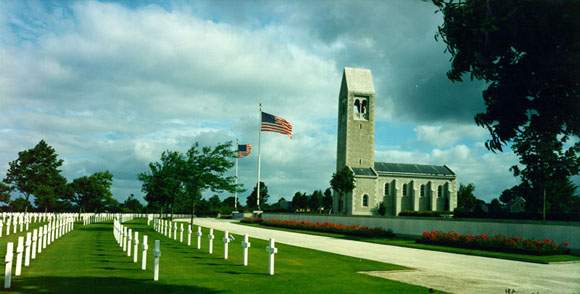
Brookwood, England American Cemetery 468 of our dead.
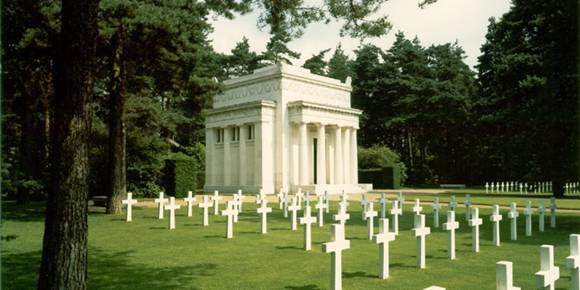
Cambridge, England 3812 of our military dead.
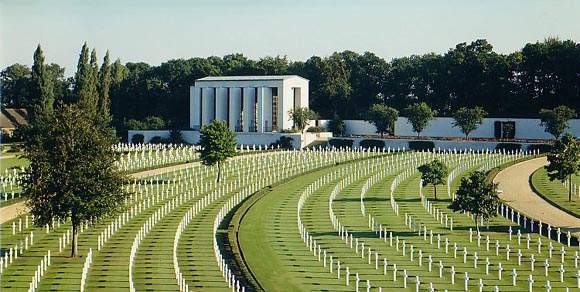
Epinal, France American Cemetery 5525 of our Military dead.
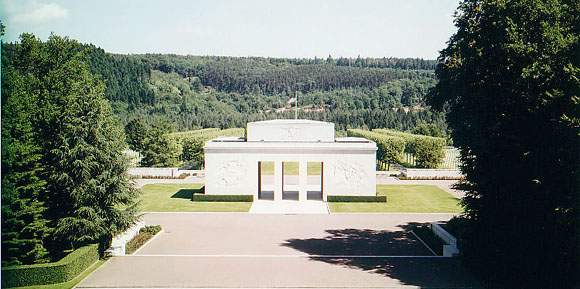
Flanders Field, Belgium 368 of our military.
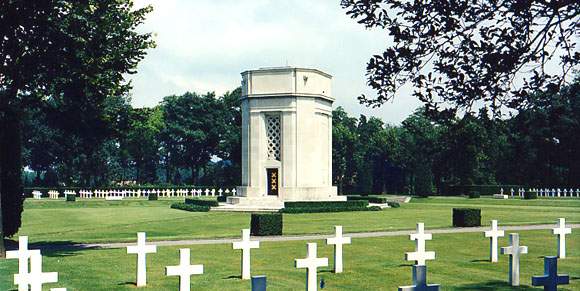
Florence, Italy 4402 of our military dead.
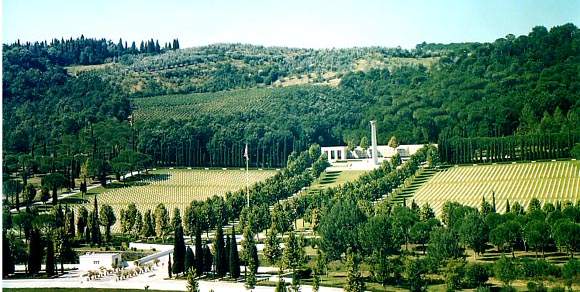
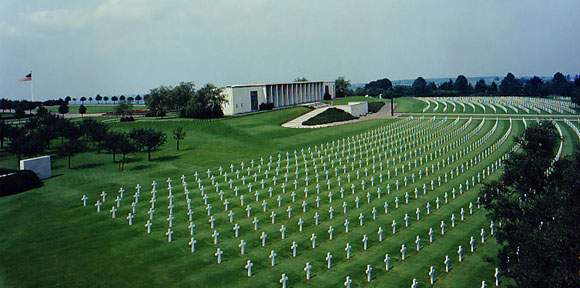
Lorraine, France 10,489 of our military dead.
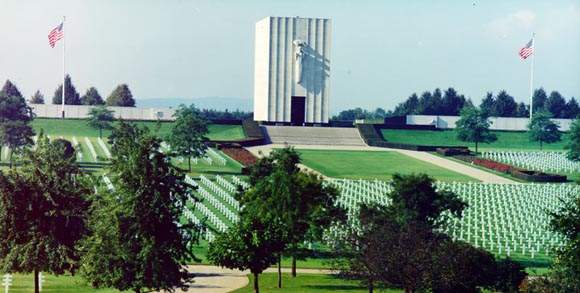
Luxembourg 5076 of our military dead.

Meuse-Argonne 14246 of our military dead.
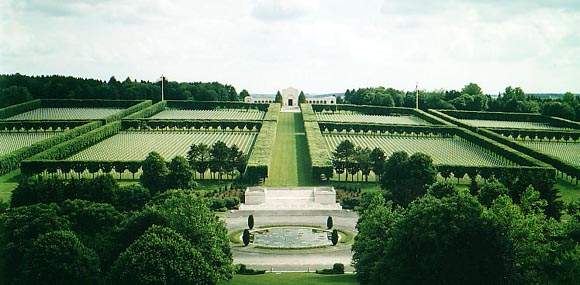
Netherlands, Netherlands 8301 of our military dead.

Normandy, France 9387 of our military dead.
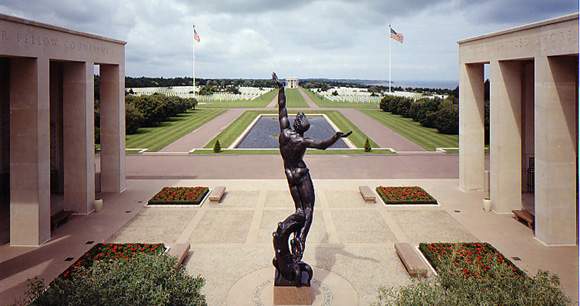
Oise-Aisne, France 6012 of our military dead.
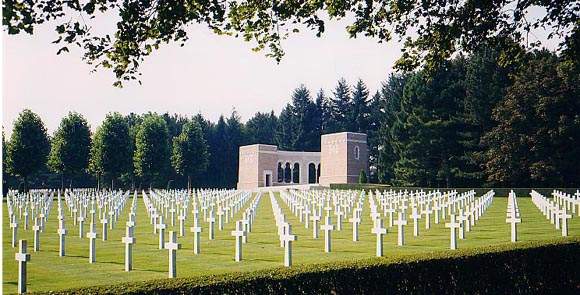
Rhone, France 861 of our military dead.
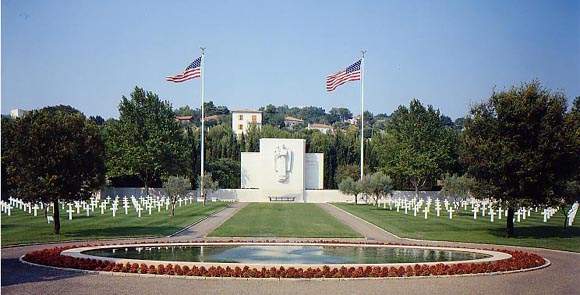
Sicily, Italy 7861 of our military dead.
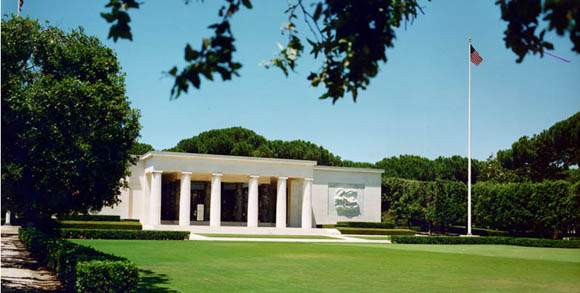
Somme, France 1844 of our military dead.
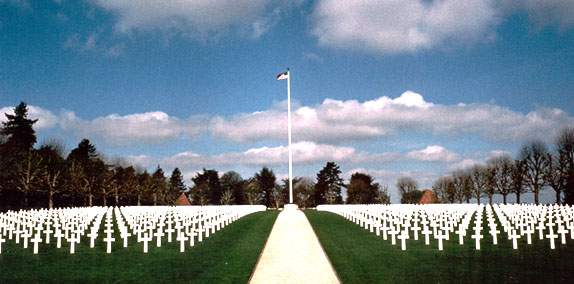
St. Mihiel, France 4153 of our military dead.
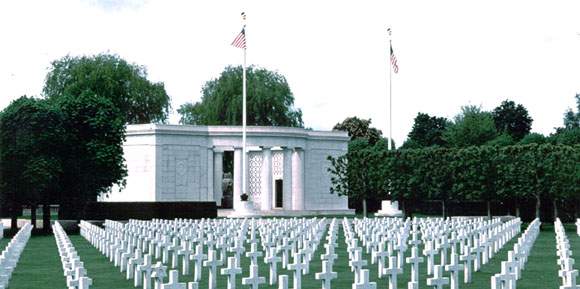
Suresnes, France 1541 of our military dead.
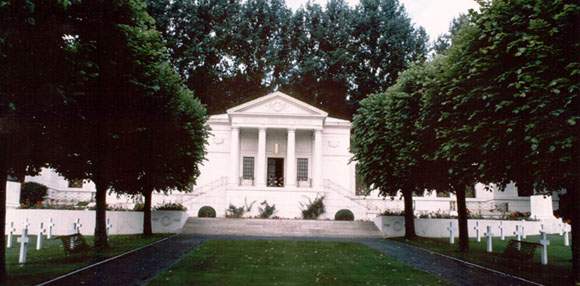
THE COUNT IS 104,366
Day is done,
gone the sun,
From the hills,
from the lake,
From the skies.
Rest in Peace,
Soldiers brave,
God is nigh.
25) "Don't fire until you see the whites of their
eyes!" -- William Prescott at the Battle Of Bunker Hill
24) "To be prepared for war is one of the most effective means of
preserving peace." -- George Washington
23) "When this war is over, the Japanese language will be spoken only in
hell!" -- Admiral Bill Halsey on December 7, 1941
22) "Nuts." -- The response of General Anthony MacAuliffe, when asked to
surrender during the Battle of the Bulge, 1944
21) "I tremble for my country when I hear of confidence expressed in me.
I know too well my weakness, that our only hope is in God." -- Robert E.
Lee
20) "War is cruelty. There is no use trying to reform it. The crueler it
is, the sooner it will be over." -- Gen William T. Sherman
19) "Of the Marines on Iwo Jima, uncommon valor was a common virtue." --
Chester W. Nimitz
18) "They've got us surrounded again, the poor bastards." -- Creighton
W. Abrams, Battle of the Bulge
17) "Don't fire unless fired upon, but if they mean to have a war, let
it begin here" -- Captain John Parker, 1775
16) "We have gone forth from our shores repeatedly over the last hundred
years and we've done this as recently as the last year in Afghanistan
and put wonderful young men and women at risk, many of whom have lost
their lives, and we have asked for nothing except enough ground to bury
them in, and otherwise we have returned home to seek our own lives in
peace." -- Colin Powell
15) "We have met the enemy and they are ours!" -- Oliver Hazard Perry
14) "It is the soldier, not the reporter, who has given us freedom of
the press. It is the soldier, not the poet, who has given us freedom of
speech. It is the soldier, not the campus organizer, who has given us
the freedom to demonstrate. It is the soldier, who salutes the flag, who
serves beneath the flag, and whose coffin is draped by the flag, who
allows the protester to burn the flag." -- Father Dennis Edward O'Brien,
USMC
13) "I wish to have no connection with any ship that does not sail fast;
for I intend to go in harm's way." -- John Paul Jones
12) "Damn the torpedoes, Full speed ahead!" -- Admiral David Glasgow
Farragut
11) "I have only two men out of my company and 20 out of some other
company. We need support, but it is almost suicide to try to get it here
as we are swept by machine gun fire and a constant barrage is on us. I
have no one on my left and only a few on my right. I will hold." --
Clifton B. Cates, Belleau Wood, July 1918
10) "Yonder are the Hessians. They were bought for seven pounds and
tenpence a man. Are you worth more? Prove it. Tonight the American flag
floats from yonder hill or Molly Stark sleeps a widow!" -- John Stark at
the Battle of Bennington in 1777
9) "Goddam it, you'll never get the Purple Heart hiding in a foxhole!
Follow me!" -- Henry P. Crowe
8) "Victory was never in doubt. Its cost was...What was in doubt, in all
our minds, was whether there would be any of us left to dedicate our
cemetery at the end, or whether the last Marine would die knocking out
the last Japanese gun and gunner." -- Major General Graves B. Erskin in
reference to the Battle Of Iwo Jima
7) "Come on, you sons of b!tches! Do you want to live forever?" -- Dan
Daly, WWI
6) "Don't you forget that you're First Marines! Not all the communists
in Hell can overrun you!" -- Lieutenant General Lewis "Chesty" Puller
when surrounded by eight enemy divisions
5) "Get there first with the most." -- Nathan Bedford Forrest
4) "It is fatal to enter a war without the will to win it." -- Douglas
MacArthur
3) "I am besieged by a thousand or more of the Mexicans under Santa
Anna. I have sustained a continued bombardment for twenty-four hours and
have not lost a man. The enemy have demanded a surrender... otherwise
the garrison is to be put to the sword if the place is taken. I have
answered the summons with a cannon shot, and our flag still waves
proudly from the walls. I shall never surrender or retreat." -- William
B. Travis, Alamo
2)"If you kill enough of them, they stop fighting." -- Curtis LeMay
1) "No bastard ever won a war by dying for his country. He won it by
making the other poor dumb bastard die for his country." -- George
Patton
James Madison, essay in the National Gazette, 1792 -
"A universal peace, it is to be feared, is in the catalogue of events, which will never exist but in the imaginations of visionary philosophers, or in the breasts of benevolent enthusiasts."Understanding American Security
By Theodore R. Bromund, Ph.D. and Luke Coffey - For the Founding Fathers, a primary and central duty of the federal government created by the Constitution is to 'provide for the common defence.' The reason is simple: If we are not secure, we cannot be free. ... So when you think about American security, the first thing you need to remember is that, in the long run, the strength of America rests not solely on its armed forces. It also rests in the growth, the energy, and the flexibility of the American economy. ... But we can't just buy defense when times are good. Defense is like an insurance policy. If you have to take a job that pays less, you should spend less on vacations and nice restaurants. But it wouldn't be a good idea to stop paying your car insurance bill. Insurance protects you from big expenses that you can't afford. When times are tight, you need insurance more, not less. ... Being prepared for this dangerous world means we have to keep our military ready to defend our interests. It also means that we have to follow economic policies that will allow us to pay for the kind of military we need. ... George Washington was right to say, in his first State of the Union Address, that 'To be prepared for war is one of the most effective means of preserving peace.'
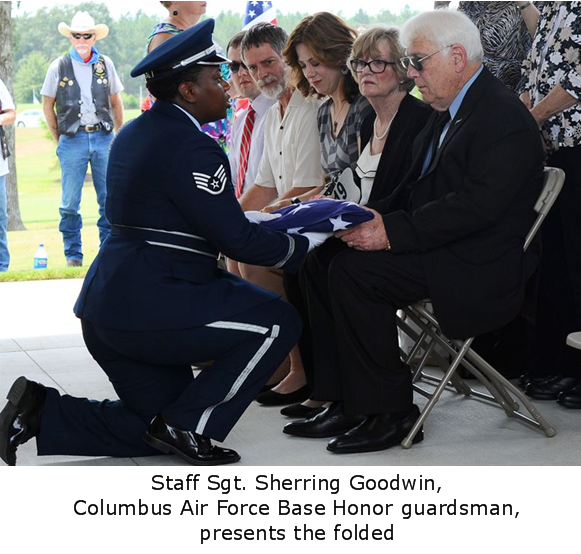
Meaning
of Flag Draped Coffin - By Jim Kelly
All Americans should be given this lesson. Those who think that
America is an arrogant nation should really reconsider that
thought. Our founding fathers used GOD's word and teachings to
establish our Great Nation and I think it's high time Americans
get re-educated about this Nation's history. Pass it along and
be proud of the country we live in and even more proud of those
who serve to protect our 'GOD GIVEN' rights and freedoms.
I hope you take the time to read this... To understand what the flag draped coffin really means... Here is how to understand the flag that laid upon it and is surrendered to so many widows and widowers.
Do you know that at military funerals, the 21-gun salute stands for the sum of the numbers in the year 1776?
Have you ever noticed the honor guard pays
meticulous attention to correctly folding the United States of
America Flag 13 times? You probably thought it was to symbolize
the original 13 colonies, but we learn something new every day!
The 1st fold of the flag is a symbol of life.
The 2nd fold is a symbol of the belief in eternal life.
The 3rd fold is made in honor and remembrance of the veterans
departing the ranks who gave a portion of their lives for the
defense of the country to attain peace throughout the world.
The 4th fold represents the weaker nature, for as American
citizens trusting in God, it is to Him we turn in times of peace
as well as in time of war for His divine guidance.
The 5th fold is a tribute to the country, for in the words of
Stephen Decatur, 'Our Country, in dealing with other countries,
may she always be right; but it is still our country, right or
wrong.'
The 6th fold is for where people's hearts lie. It is with their
heart that They pledge allegiance to the flag of the United
States Of America and the Republic for which it stands, one
Nation under God, indivisible, with Liberty and Justice for all.
The 7th fold is a tribute to its Armed Forces, for it is through
the Armed Forces that they protect their country and their flag
against all her enemies, whether they be found within or without
the boundaries of their republic.
The 8th fold is a tribute to the one who entered into the valley
of the shadow of death, that we might see the light of day.
The 9th fold is a tribute to womanhood, and Mothers. For it has
been through their faith, their love, loyalty and devotion that
the character of the men and women who have made this country
great has been molded.
The 10th fold is a tribute to the father, for he, too, has given
his sons and daughters for the defense of their country since
they were first born.
The 11th fold represents the lower portion of the seal of King
David and King Solomon and glorifies in the Hebrews eyes, the
God of Abraham, Isaac and Jacob.
The 12th fold represents an emblem of eternity and glorifies, in
the Christians eyes, God the Father, the Son and Holy Spirit.
The 13th fold, or when the flag is completely folded, the stars
are! uppermost reminding them of their nations motto,'In God We
Trust.'
After the flag is completely folded and tucked in, it takes on
the appearance of a cocked hat, ever reminding us of the
soldiers who served under General George Washington, and the
Sailors and Marines who served under Captain John Paul Jones,
who were followed by their comrades and shipmates in the Armed
Forces of the United States, preserving for them the rights,
privileges and freedoms they enjoy today.
There are some traditions and ways of doing things that have
deep meaning. In the future, you'll see flags folded and now you
will know why. Share this with the children you love and all
others who love what is referred to, the symbol of ' Liberty and
Freedom.'
MAYBE THE SUPREME COURT SHOULD READ THIS EXPLANATION BEFORE THEY
RENDER THEIR DECISION ON THE PLEDGE OF ALLEGIANCE.
IN THE MEANTIME, MAY GOD PROTECT US ALWAYS. ONE NATION, UNDER GOD, WITH LIBERTY AND JUSTICE FOR ALL.


